Application Team Impact Award is open
Whether you're a learner, a teamcher or a researcher, all community members of ECIU are welcome to apply voor de The ECIU Team Impact Award.
With this award, the organisation wants to put teams in the spotlight who have demonstrated exceptional collaboration, creativity, and dedication in addressing real-world ECIU University challenges.
It recognizes learners, staff and external stakeholders who have gone above and beyond to develop meaningful, sustainable solutions with a positive impact on communities. Show the entire community the impact of the challenge YOU took on.
Click this link for all information about registration and the criteria used. Deadline for application is March 31, 2025.
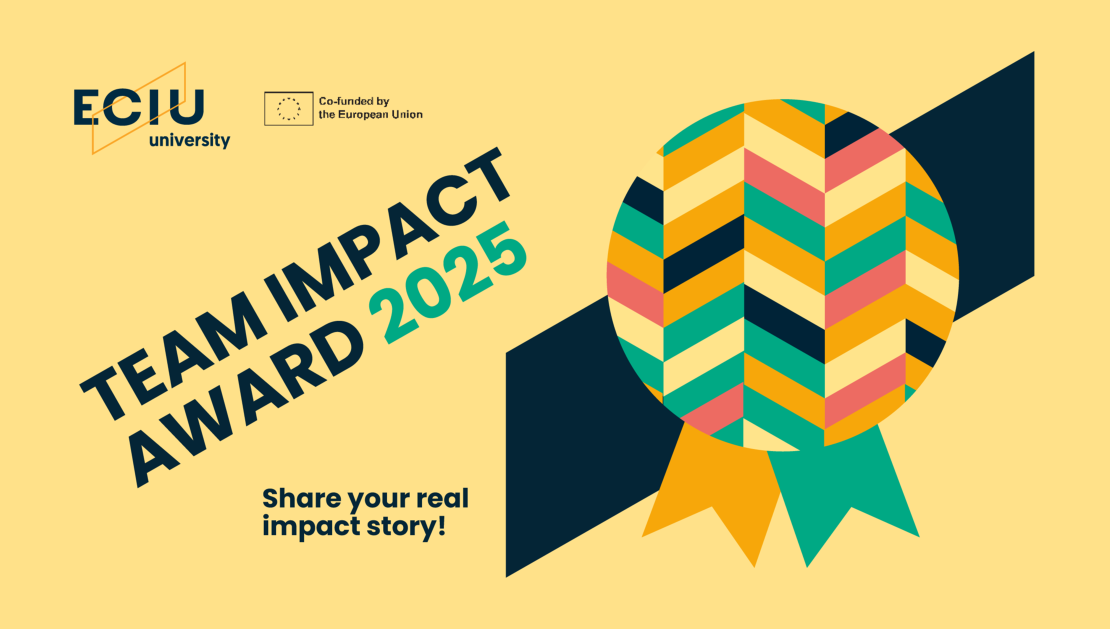
Archive
- 2024
- Travelling around Europe with interrail pass
The Interrail Pass for Erasmus+ is a six-month pass valid for participants who travel by train during their Erasmus+ experience. The pass was created to fulfil the current priority of the Erasmus+ programme: environment and the fight against climate change.
In order for you to start your mobility journey the best way possible, the Erasmus Student Network in partnership with Eurail invites you to go aboard with the Interrail Pass for Erasmus+.
The Interrail Pass for Erasmus+ was created exclusively by considering the needs of Erasmus+ participants. You can choose between two versions of the Pass: 4 or 6 travel days to use over six months.
You can purchase the pass using the green travel funding support provided by the Erasmus+ Programme grant scheme. Remember to inquire for more details at our International Relations Office to confirm your eligibility for this funding and understand the specific conditions.
Additionally, if you have any questions about the pricing, the eligibility of your country, or any other information we invite you to visit the dedicated website.

- From our student ambassadors
Last week, we went to Strasbourg, one of the (or perhaps the) Christmas capitals of Europe. Such a trip is, of course, amazing; visiting the beautiful Christmas market while sipping on hot Vin Chaud is an experience everyone should have had at least once. However, alongside all this “gezelligheid,” we were there for an ECIU training week, focusing on intercultural competences.
The intercultural experience was not limited to just lectures and dry theory; we attended the training week in Strasbourg together with other student ambassadors from a plethora of ECIU universities. Meeting the other student ambassadors was an amazing experience—whether it was working on a project together or having deep conversations in the cellar of a French restaurant. For us, our week in Strasbourg is a week where new friendships were formed and memories were made.
Nicolai Holtkamp and Sander Teune
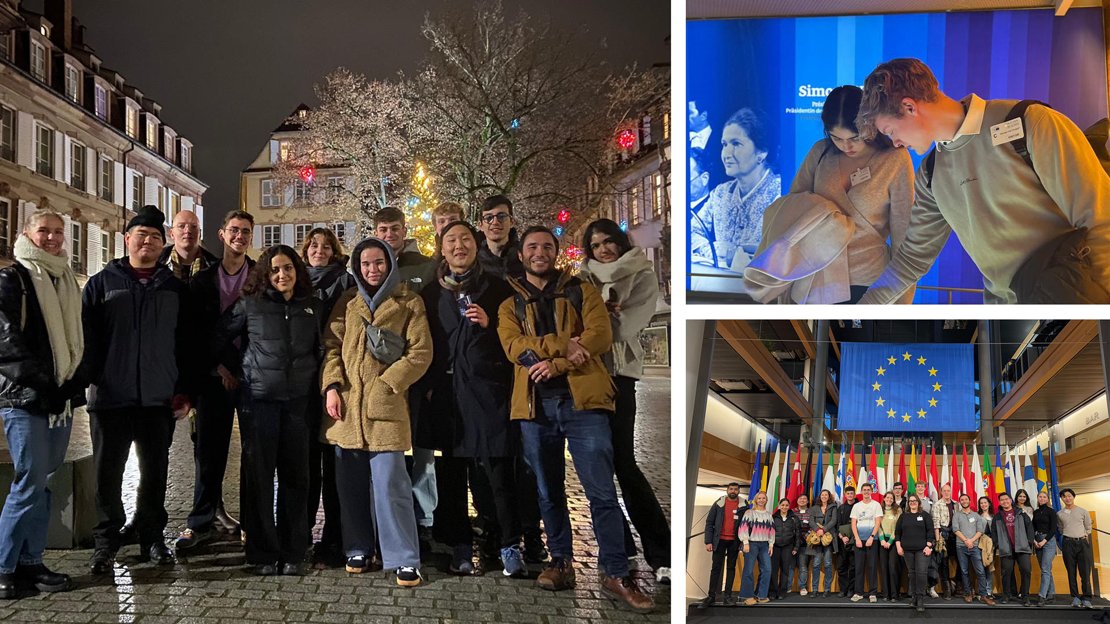
- Team Day: From octopus to enlightening
The ECIU University Team @UT held its first team day last Tuesday. About fifteen members were present in the Kleine Zaal in the Vrijhof to get to know each other in real life and to explain their work for ECIU University.
The fact that a team day on the UT campus was desperately needed was evident from the enthusiastic greeting of colleagues who had not seen each other live before. Because the group has been working together (online) for a while, but has not often met outside of work, Liv Hassinger, the Institutional Coordinator of ECIU University @UT, brought in a real icebreaker: step over the line if you... fill in the blanks. When everyone knew from each other whether they had pets, children or phobias, who played an instrument or was a collector, the team got to work.
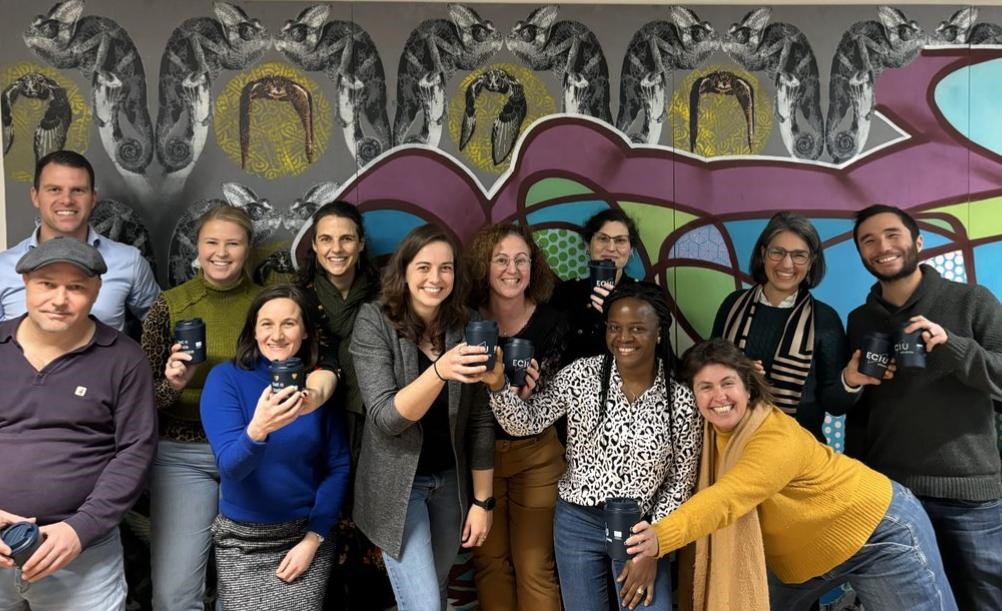
From the left:
Peter van Roosmalen: General Affairs – Innovation Lab - In-house Legal Counsel Team. Regular tasks within ECIU @ UT: Legal advisor UT in relation to UT's ECIU participation Regular tasks within ECIU Central (not UT-specific): Chairman ECIU IP Working Group, legal advisor ECIU Foundation.
Tim Jongman (with cap): Part of the ECIU@UT Challenge Team, CBL-expert from UT and is specialised in involving externals in education, via Novel-T.
Laurette van der Woning: Strategy & Policy. Regular tasks within ECIU @ UT: Coordinating the formal updates to UT gremia.
Liv Hassinger: Institutional Coordinator ECIU University @UT.
Mieke Beurskens: UT-CES/SP. Regular tasks within ECIU @ UT: ECIU@UT Promo-Team, ECIU@UT Internal Community, close ties with UT-CELT and the CBL-teaching community at UT. Additional (temporary) projects within ECIU @ UT: I co-organise the ECIU-U@UT Staff Days 2024, Smoelenboek and the Internal Community Team Day. Regular tasks within ECIU Central (not UT-specific): Liaison manager for WP8.2 (creating capacity and building competence).
Pam Huisintveld: General Affairs – Innovation Lab. Regular tasks within ECIU @ UT: Learning Portfolio coordinator and Community coordinator. Additional (temporary) projects within ECIU @ UT: Organising the ECIU Staff Days at UT, exploring the possibility of creating an ECIU University association, setting up ECIUU @ UT Instagram, role of Admission O3icer (every administrative task around the ECIU platform). Regular tasks within ECIU Central (not UT-specific): Organising ECIU Central events.
Sandra Pool: General Affairs – Marketing & Communication (M&C) and U-Today. Regular tasks within ECIU @ UT: Using the internal channels @ UT to contribute to more awareness of ECIU University @ UT Regular tasks within ECIU Central (not UT-specific): Work package 9: Marketing & Communication.
Yael Veenstra: CES / SACC. Regular tasks within ECIU @ UT: ECIU mobility officer assisting outgoing UT staff members and students to ECIU. Regular tasks within ECIU Central (not UT-specific): Coordinate the UT’s ECIU mobility fund and other Erasmus mobility instruments (BIPs) with the educational and community-building activities of the ECIU University and manage the mobility fund and questions from UT students and sta3 about mobility to ECIU learning opportunities and community building activities.
Efia Addo: Green Hub (CFM). Regular tasks within ECIU @ UT: Face to face guidance (student advisor network) - Students and study advisors. Additional (temporary) projects within ECIU @ UT Community building.
Flavia Carvalho de Souza (yellow sweater): Support implementation of the mobility plan.
Telma Rodrigues da Silva Esteves: SBD – GS. Grant Office.
Ryan Wakamiya: Strategy & Policy – International Affairs. Regular tasks within ECIU @ UT: Teachers and education programs looking to develop/adapt courses within ECIU University. Regular tasks within ECIU Central (not UT-specific): Learner Engagement Coordinator -- developing ECIU Student Ambassador Scheme, Student Council, helping with WP2 Learner Guidance/WP7 UX from a student perspective.
Key points ECIU University @UT Programme plan
1. Exchange of students within BSc and MSc programmes
2. A joint minor with multiple ECIU partners that is available to and of interest to all UT (and partner) students
3. Piloting the LLL concept of the Learning Community within the ECIUU context
4. Enhanced staff mobility
5. Arranging the necessary support infrastructures to facilitate the previous, such as the Teacher Hub e the Engage platform.
Back to the team day. After everyone had explained his or her role, questions were asked back and forth, the takeaways were presented. For some, the day was enlightening, for others the word octopus stuck as the key word of the day. Organisers Mieke Beurskens and Pam Huisintveld concluded at the end of the day that sessions on the shop floor are important 'to promote the team spirit even more.'
- Niall power new director ECIU University
Niall Power new Director of ECIU University
The Director position of ECIU University was offered to Niall Power from the University of Aveiro. As announced in October, there were two interview rounds involving Presidium and Board members and colleagues from the Central Team.
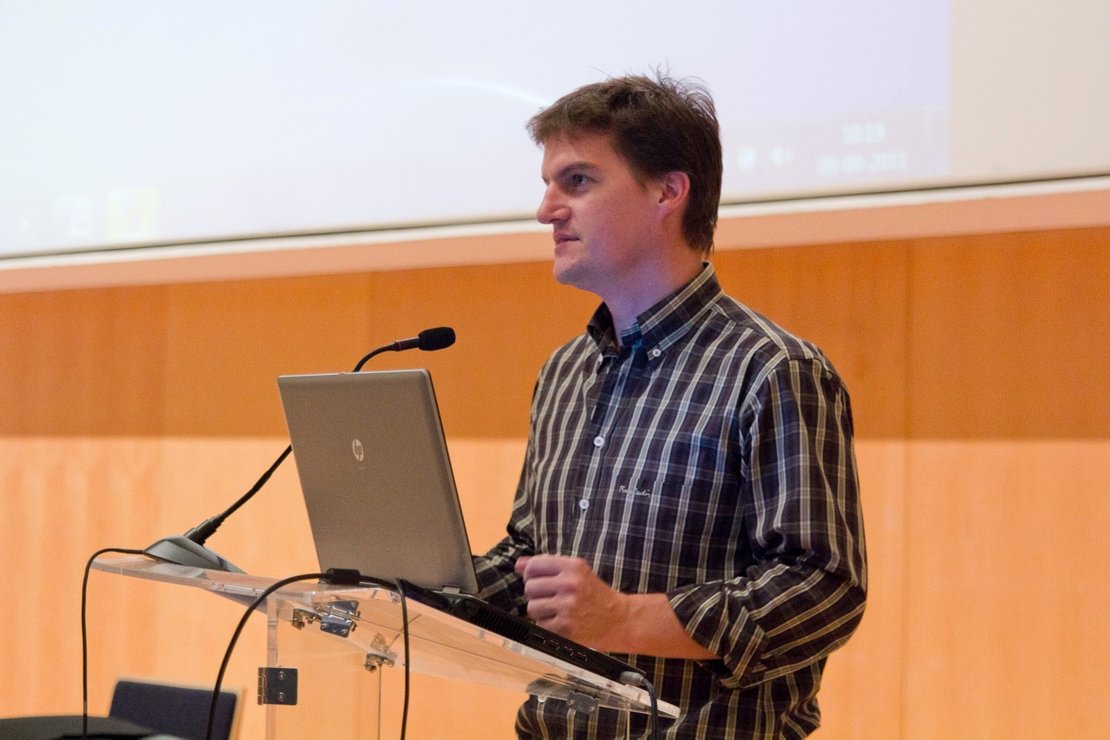
Niall Power has been with the ECIU for more than two decades and is well known to almost everybody in the organisation. We therefore anticipate that his transition into his new role will be smooth and efficient such that by 2 January 2025 he will be work exclusively as the ECIU University Director.
The Presidium would like to thank the University of Aveiro for its cooperation by releasing Niall of his former duties and appointing a new Institutional Coordinator there in due course.
- Join the European student assembly and apply now
Applications for the European Student Assembly (ESA) 2025 are NOW OPEN! 🎉 This flagship event of the EUC Voices Erasmus+ project brings together 250 students from all European university alliances, including ECIU University – of wich UT is a partner - , to draft policy recommendations for different current issues in interdisciplinary teams. ECIU central will fund 5 students this year to attend. Funding includes travel, hostel, and meals.
ECIU University students selected to attend will work online in teams to prepare policy proposals from February-May, 2025 and then meet physically in Strasbourg, France at the European Parliament from 26-28 May, 2025, to finalise and vote on these proposals. Among the topics that will be addressed this edition, there is the interplay between AI and democracy, the creation of affordable housing and fostering of intercultural understanding.
For more information about the event and application, go to http://www.eucvoices.eu/it/node/56. Deadline for applications is 1st December, 2024. For any questions about the application process, feel free to contact ryan.wakamiya@eciu.eu
- 'CBL offers new perspectives, fresh ideas and inspiration'
Did you know that the UT is always innovating in the field of education? That's why our teachers are immersing themselves in Challenge-Based Learning (CBL) during the so called Staff Days. They learn to apply this new teaching method in their own lectures. Assistant Professor Ana-Mafalda Madureira already has experience with CBL and is excited.
'The best thing about Challenge-Based Learning is the great diversity in results,' says Madureira. 'In recent years, we have run the same challenge with different student groups. The results were different each time. I like that. It offers new perspectives, fresh ideas and inspiration.'
Using strengths
Madureira works as an urban geographer for the ITC faculty at the department of Urban and Regional Planning and Geo-Information Management. During the so-called ECIU Staff Days in November at the UT, she is happy to share her knowledge with interested colleagues. 'We are going to work on a case about connecting the UT campus and the neighbourhood opposite, Twekkelerveld. How can we link these two areas by using the strengths of both neighbourhoods?’
A variety of perspectives
According to her, the core of CBL is bringing perspectives together. ‘What does the municipality think, how does the housing corporation sees it, what are the ideas of the campus facility manager? It is important to include these stakeholders perspectives.’
The icing on the cake, she says, is the input of students. 'And especially from all those different study backgrounds. For example, a Public Administration student wishes that the voice of the local residents is heard, while an Urban Design student looks at how the barrier of the Hengelosestraat can be tackled, ITC students have an eye for changes in the socio-demographic composition of the neighbourhood, do people feel at home? And Industrial Design students may want to design an artifact for the neighbourhood. These are some examples of which way things could go.’
Educational innovation
Madureira plans to offer this case as a challenge for students of the ECIU University, a network of twelve European universities of which the UT is a partner. During the Staff Days on the UT campus, she hopes to receive input from colleagues on how to shape the challenge and fit it into the existing structure of all these universities. 'And that, of course, teachers become enthusiastic about Challenge-Based Learning, learn how to apply it in their own curriculum and remain curious about educational innovations.’
More information about the ECIU University Staff Days can be found here.
- Community of practice
The new academic year presents new challenges in every sense. The Challenge of the ECIU Community of Practice is to strengthen and build on the foundations we set last year. The success and sustainability of any Community depends on the engagement and participation of its members. So, this is a call to all those of you who believe in the importance of collegial support, of sharing problems, practices and proposals in an informal atmosphere as a way of fostering CBL and MM teaching and learning.
At the Community sessions, at 16.00 CET on the last Thursday of the month, we follow the Reflective Team approach: a ‘Presenter’ illustrates a sticky issue and asks the “Team” for help with a specific question; the “Team” reflect on the case, sharing their own experiences, making suggestions for actions and concrete proposals to address the issue, the Presenter listens but does not join in the discussion; during the “Debrief” the Presenter identifies which proposals they might implement in their next CBL experience.
To give you a flavour of the issues presented during our sessions, here are some of the questions from the Spring:
· Coaching students in a CBL setting: What can I do in the first weeks to ensure that students are not completely lost already at the beginning?
· Measuring the unmeasurable: How can we show students are developing transferable skills?
· How can we promote responsible partnerships with society while implementing CBL?
· What strategies can we implement to boost student recruitment?
To find out more about each case, go to the documents section on the Teachers Hub where you can find the Presentations describing the context of each case and the possible actions the “Team” proposed to address them.
The next sticky issues we will try to unstick during November is:
28th November 16.00 CET: How can we make peer observation of CBL more appealing?
Which issues we address is totally in the hands of the Community members. So, if there is any issue you would like to present or see as the focus of a session, please get in touch with the CoP facilitator Kate Riley (catherine.riley@unitn.it). And we can revisit topics – each issue has multiple facets worth exploring, so don’t be put off if we’ve already covered it.
The ECIU is about co-creation, cooperation and collaboration. The Community of Practice embodies these principles, we hope you will come and join us!
Kate
- Teamcher Kick Off
Invitation to join the 2024 TEAMCHER KICK OFF on October 23rd from1 to 2 pm (CET). As we begin another academic year, we cordially invite you to join us in starting the semester with a discussion on experiences of designing and implementing an ECIU ELO. Check out the PDF below with more details about the event.
Invitation
- The perfect CBL Espresso
Engage, investigate and act. These three ingredients form the perfect basis for the Challenge-Based Learning Espresso, a manual , which will immerse teachers in the transformative world of challenge-based learning.
The challenge-based learning approach is an intuitive solution-finding method that allows you to draw on your existing experience, competences, and to analyse the challenge from different perspectives.
The CBL Espresso is full of exercises and the steps to follow to find a solution within a challenge. It ranges from randomly asking questions to participants, to learning the five why’s technique to uncover the underlying reasons for almost any issue. All intended to thoroughly analyse the topic of a challenge to find a suitable solution.
Want to know more about CBL? Join our community of practice by sending an email to: catherine.riley@unitn.it
Click the brochure CBL Espresso link to find out more.
- Establishment of the ECIU Student Council
The University of Stavanger was delighted to receive so many delegates from ECIU member institutions and external stakeholders during the week of governance meetings from 1.-4. October.
Perfectly assisted by extraordinary, sunny autumn weather, the UiS hosted the meetings of the first formal Student Council, the institutional coordinators, the VP groups for Education and Research and the ECIU Board.
The programme included a visit for the ECIU Board to the Iron Age Farm (a part of the UiS) and a site visit to Innoasis, Norway's new hub for urban innovation.
Student Council established
An important milestone during the week was the formal establishment of the ECIU Student Council. In close collaboration with the Learner Engagement Coordinator Ryan Wakamiya and with support by the host Student Organisation (StOr) Marija Pedersen and Tim Marshall (WP2 Lead), the council elected:
- Eddie Arriaga, Council President and Board member
- Ellen Ivarius Andersson, Council Vice-President
- Jakob Meyer Vevatne, Board member
- Veerle de Vocht, VP Education Delegate
- Karl Ormsby, Council Secretary
All of ECIU is supporting this important step to engage student voices and is looking forward to co-creating the ECIU University and shaping the future of higher education together with the students.
- Basic principles in challenge-based learning
This workshop (on Thursday October 17) is primarily aimed at teachers who either have first experiences with project- or project-based learning and/or are highly motivated to try challenge-based learning.
At the end of the workshop, participants will be able to make an informed decision if they want to give challenge-based learning a try in their courses. They know about the basic principles in challenge-based learning, each step and the different roles (e.g. of the external partner) and how to combine it with their teaching. They will be able to implement (at least parts of) CBL in their own teaching

Challenge-based learning is a pedagogical approach that actively engages students in a situation that is real, relevant and related to their environment. It takes places through the identification, analysis and design of a solution to a sociotechnical problem. The learning experience is typically multidisciplinary, involves different stakeholder perspectives, and aims to find a collaboratively developed solution, which is environmentally, socially and economically sustainable.
Registration until October 10
Workshop by Siska Simon, Cecile Holzner-Jacques, Katja Auffret (English)
Please send an e-mail to:
siska.simon@eciu.eu and cecile.holzner-jacques@eciu.eu
- Spice up your studies
As the new academic year begins, ECIU University – of which UT is a partner - invites you to the latest challenges and micro-modules. Discover over 70 learning opportunities and get a unique chance to develop diverse skills for your career, get in touch with students from all over Europe and even visit another university.
Check out the details and requirements here and get started!
If you have more questions about ECIU University and our learning opportunities, reach out to us via this contact form or explore our FAQ section.
With over 1000 students and more than 100 companies already participating, we can’t wait for you to start a journey of your own. Join in – and challenge your way of thinking.
Don't want to miss any opportunities? Subscribe to our newsletter where we share the latest challenges, micro-modules and events that might pique your interest.
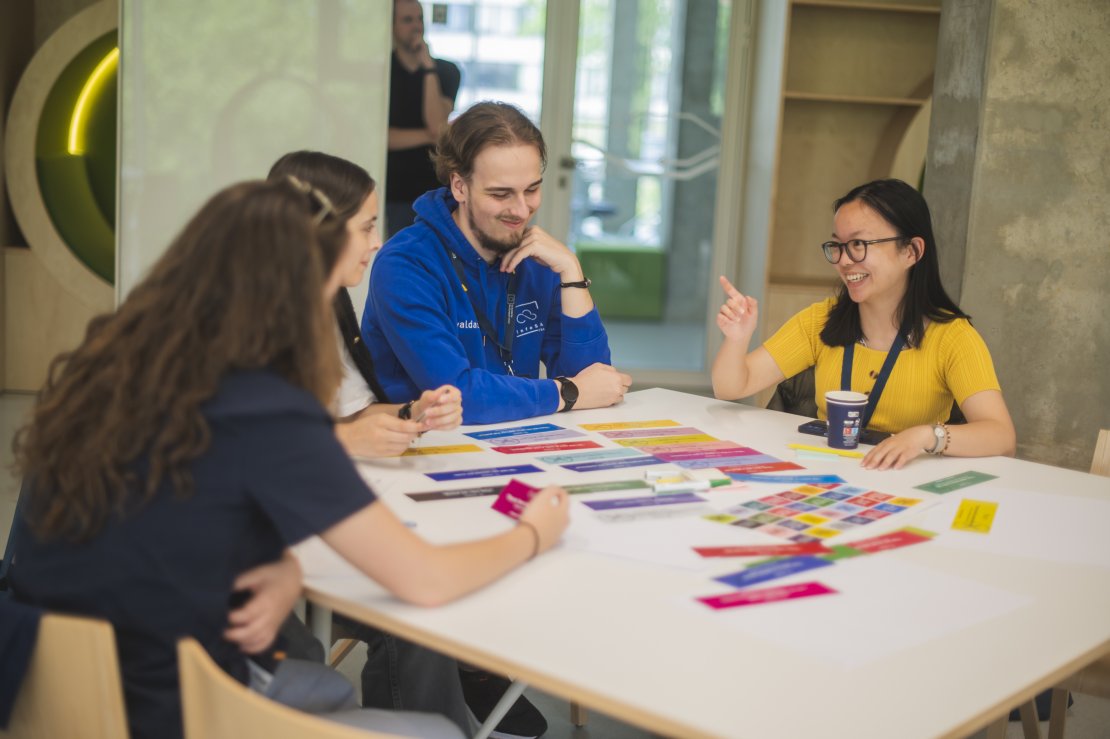
- Challenge-Based Learning enhanced by Virtual Reality
Our partner university from ECIU University – Universitat Autònoma de Barcelona - invites two representatives per university to participate in their 3-day immersive course to unlock the potential of combining virtual reality (VR) with challenge-based learning (CBL).
Extension of the application deadline
We’d like to announce an of the CBL enhanced by VR course. We believe this adjustment will be more convenient for many of us. The new application deadline is September 8th and the admission process will be as follow:
- On September 9, UAB will distribute the candidate list to each institution.
- By September 12 each institution will have selected two candidates from the list. Then, the applicants will be offered a place in this learning opportunity, which they will have to accept before September 18.
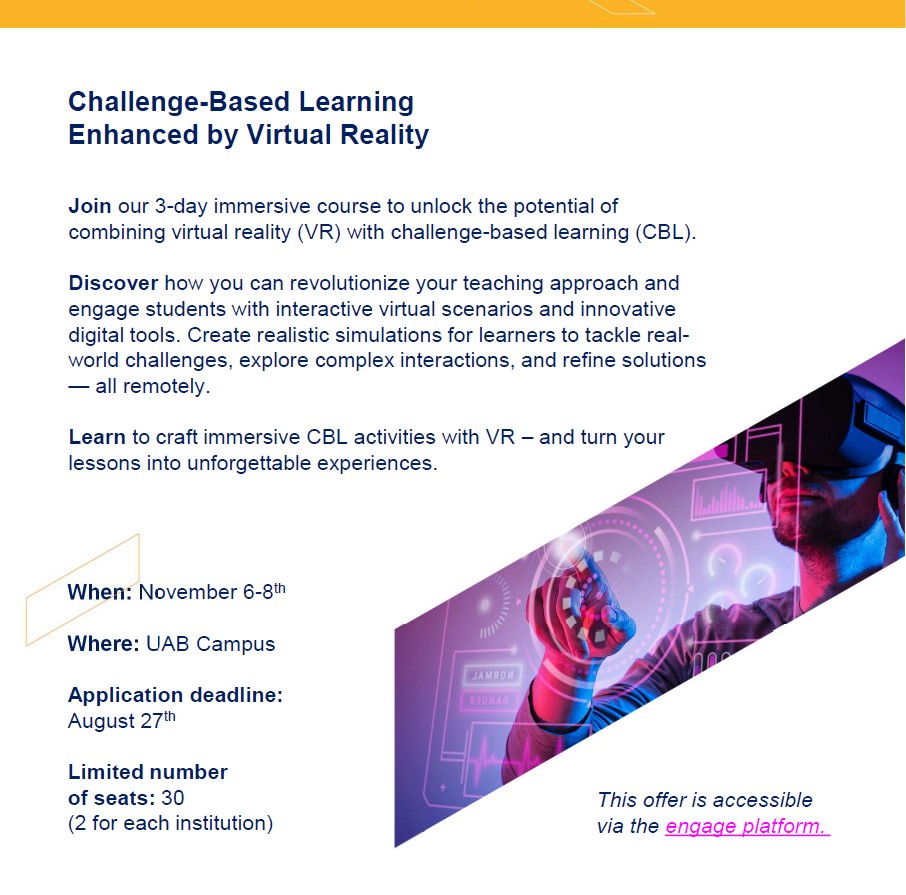
A 3-day Immersive Course to unlock the Potential of combining Virtual Reality with Challenge-Based Learning. Register here.
- Summer school
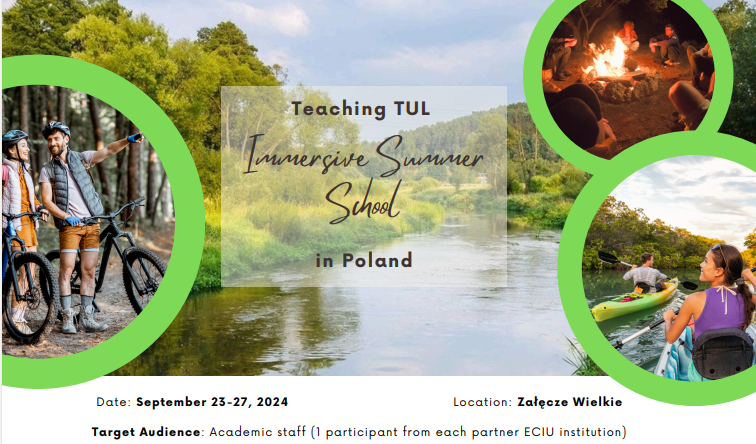
Organised by Lodz University of Technology from 23-27 September 2024; registration closes 30 July 2024.
A 5-day Immersion Workshop to create Solutions that could significantly contribute to the Implementation of the European Diploma and the Flexible Learning Paths Model. Register here.
- Teacher Hub
If you´ve heard of the Teacher Hub but have been wondering what all the buzz is about, let us introduce it to you. The Teacher Hub is the virtual ECIU*-wide Teams environment for teachers by teachers.
Being a member of the Teacher Hub helps you
- Stay informed on the latest ECIU news and events
- Have access to interesting educational materials related to Challenge-Based Learning (CBL) and MicroModules (MM)
- Get inspired by CBL success stories
- Connect with colleagues on The Meeting Place for Teachers, our informal discussion board
- Collaborate with colleagues on issues related to CBL and MM

ECIU offers support to teachers at every level of experience by organising online and f2f workshops, trainings and events, all of which are shared on the Teacher Hub. In addition, the CBL Community of Practice uses the Teacher Hub´s discussion board to share the outcomes of their monthly meetings. You´re welcome to join them, every last Wednesday of the month. You can also find the contact data of each ECIU institution´s Educational Support Manager on the Teacher Hub in case you´d like to connect directly with one of the many ECIU-institutions.
'If you´re a teacher working with or interested in Challenge-Based Learning and MicroModules, and you enjoy being engaged in international, transdisciplinary collaboration, the Teacher Hub is a one-stop-shop for support, training, and inspiration', says Mieke Beurkens, Teacher Hub Manager.
Sign up here to join us: https://www.eciu.eu/eciu-university-teacher-hub
Requests or comments
Please don´t hesitate to contact the team behind the hub with requests or comments, to share ideas or ask questions on the discussion board, and to reach out to your colleagues across the ECIU-institutions.
At ECIU, we provide the basic structure for the Teacher Hub, but we need you as active members to turn the platform into a thriving space for collaboration.
*European Consortium of Innovative Universities
- Lunch and learn
MAKE YOUR HORIZON EUROPE PROPOSAL STRONGER
Join this session to hear some hints and tips from Horizon Europe evaluators and experts in project reviews from across the ECIU Consortium on how to make your HE proposal stronger! ECIU University strives to enhance and facilitate joint funding proposals from different ECIU institutions, creating strong consortia to achieve results that have an impact on European society.
Writing a successful Horizon Europe funding proposal does not only mean careful planning and attention to the call and application form details, but it also requires that applicants look ‘in the head of an evaluator’.
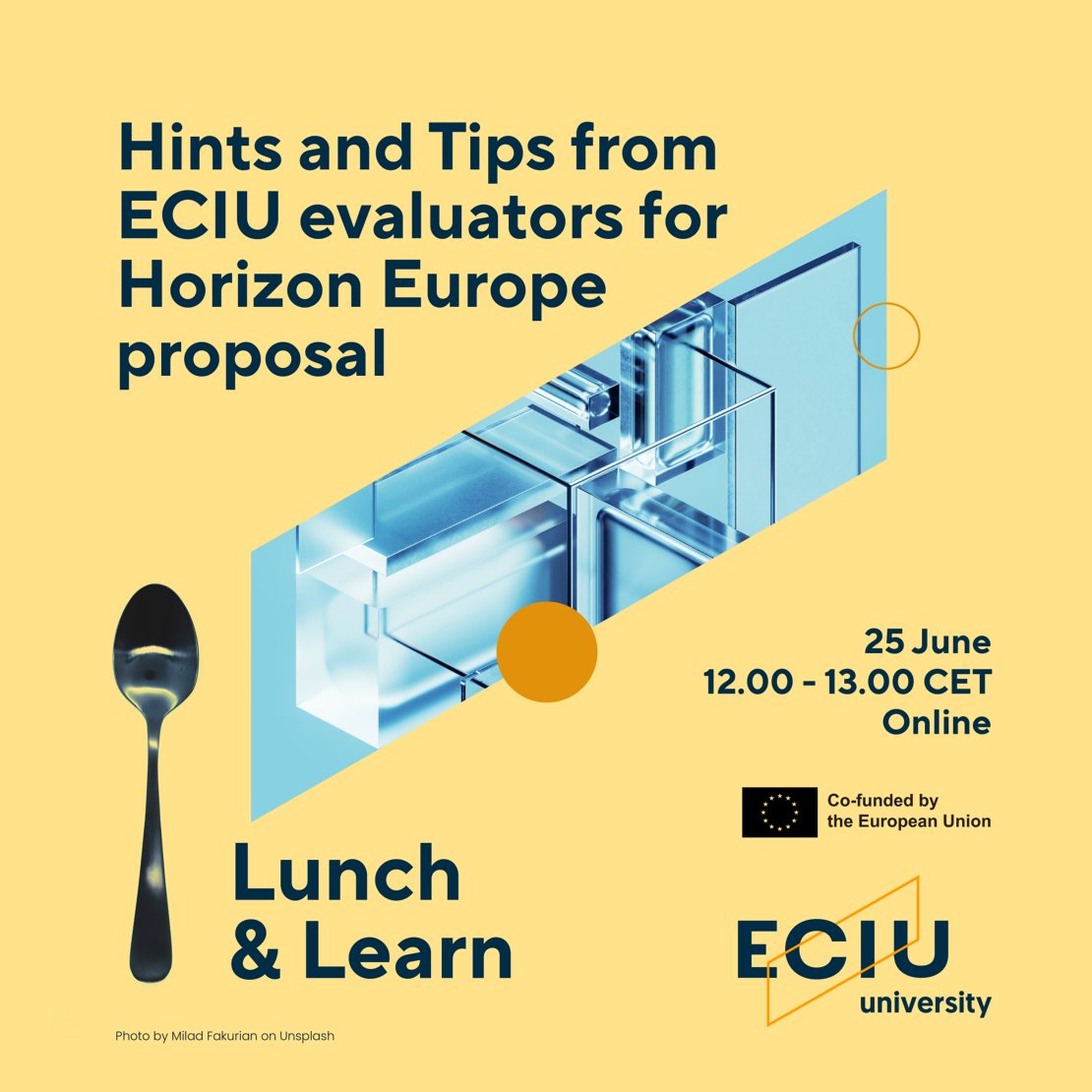
Meet our speakers
Discuss with them, being inspired to make ECIU proposals more convincing!
Monica Schofield from TUHH will guide us to think beyond what’s in the evaluators’ briefing document
Svjetlana Stekovic from LiU, will share her experience in evaluating proposals in Pillar 2-clusters, and Widening proposals
And then Leonas Balasevicius from KTU will discuss with attendees about the evaluation of MSCA DN proposals.
We hope you can join us on Tuesday 25th of June 12.00 - 13.00 CEST.
Here is the link to connect!
- Tool to take teachers into CBL
UT employees Adina Imanbayeva and Robin de Graaf developed a tool to take teachers step by step towards Challenge-Based Learning (CBL) in their education. The launch took place last Tuesday during the Week of Education.
Challenge-based learning plays an important role in your day-to-day work, please tell …..
Imanbayeva:‘I got acquainted with CBL while supporting ECIU CBL pilots at UT, and this inspired me to start a thesis on it and start my career as a CBL educational advisor. My master's thesis was entitled: Challenge-based Learning for developing students' sense of impact. Robin was my supervisor at the time.'
De Graaf: 'That's right. And I was a Teaching and Learning Fellow, which meant that I could devote one day a week to educational innovation for two years. Together with six other colleagues. And challenge-based learning was the theme. We were collecting a lot of information about CBL, but we also found that all that knowledge was quite fragmented.'
Imanbayeva: 'The idea arose to bring more structure to the available information about how CBL was building on existing education. That's what I started working on. I was trying to capture the variety of CBL implementations in practice through the CBL intensity levels and describe how education can grow into CBL step by step.’
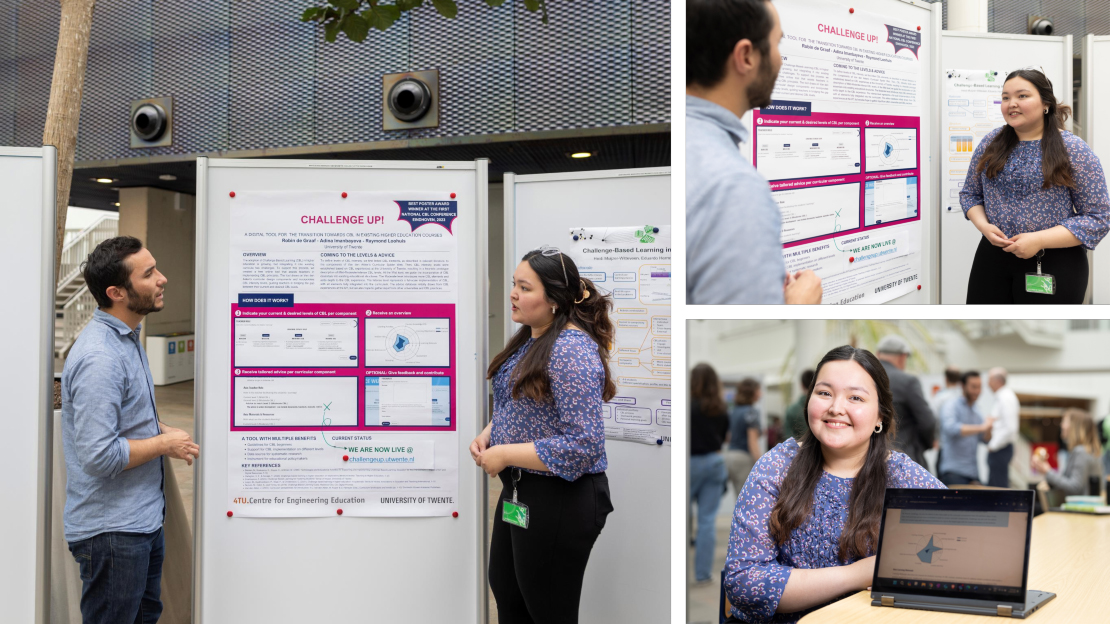
How did you end up with a tool?
Imanbayeva: ‘We developed our conceptual model around Van den Akker’s Curricular Spider Web, which captures all the components of a curriculum, from learning rationale, objectives, and activities to grouping, teacher role, and assessment. As a result, we defined Mild-Moderate-Intense CBL levels for nine components. This was turned into an app by the Mendix team from LISA and put on a website. Lecturers can now define the level of CBL intensity a course, and, if they want, also make changes step by step towards becoming more challenge-based.
Why is that important?
De Graaf: 'It may well be that a teacher already has CBL characteristics in his or her course, but is not aware of them. And for some colleagues, CBL can be a big step, while the tool allows them to take small steps.'
Imanbayeva: 'In the end, it is a step beyond traditional education, where learning is intensely student-led. In the most intense form of CBL, it is the student who determines his learning objectives. The teacher may provide advice or guidelines but doesn’t define the goals together with individual students.’
De Graaf: 'A lot of education is all about the content. You would like your students to be able to calculate with certain formulas, for example, at the end of the class period. At CBL, soft skills are more central, for example creativity, communication and collaboration.'
Imanbaeya: ‘In CBL, the focus is on the process of learning itself. Students get to work on a societal problem that they care about by determining what knowledge and skills they need to acquire to meaningfully contribute to the resolution of a societal problem. However, the main focus in CBL is not on what the students deliver in the end, but how they got there, what decisions they made, how they changed/developed, how they reflect, what they would do differently/the same, what impact the experience had on them. Students also focus on personal development.’
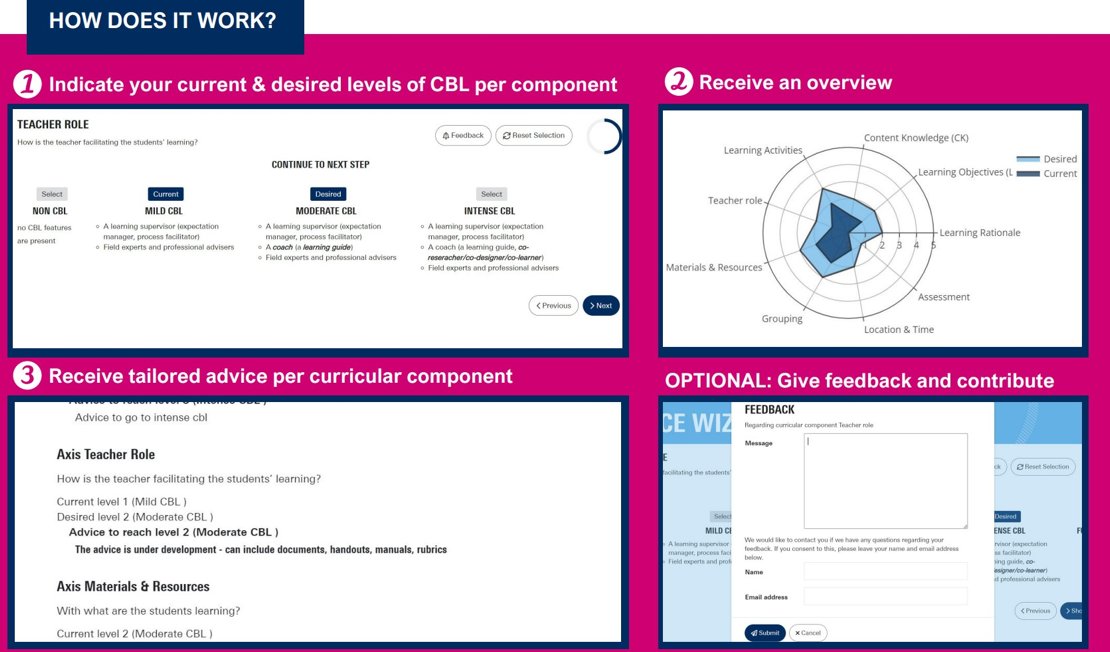
Why do we want this as UT?
De Graaf: 'At UT’s strategic level, challenge-based learning is mentioned as a way to prepare students for future challenges. CBL is a complementary learning method and does not replace other teaching methods. It’s an addition to the existing educational landscape.’
Imanbayeva: ‘We develop the tool to support teachers in implementing CBL and capture the practices we have generated in the years of CBL experimentation.’
De Graaf: 'The most important thing is that there is a platform that teachers can refer to reflect, experiment, and share their practices.’
Imanbayeva: ' Anyone online can access the tool right now. We are considering the 4TU and ECIU networks for strategic dissemination and further development of the tool.’
Check the tool here.
ABOUT
Adina Imanbayeva serves as an educational advisor and researcher at the Centre of Expertise in Learning and Teaching (CELT). With a deep commitment to advancing meaningful and authentic education, Imanbayeva specialises in Challenge-based Learning (CBL), a field where she has developed substantial expertise. She is particularly skilled in CBL course design and research, supporting teachers in creating engaging educational experiences and sharing the knowledge gained from these efforts. In addition to her advisory role, Imanbayeva is currently pursuing a PhD focused on student empowerment.
Robin de Graaf is an Associate Lecturer at the Department of Civil Engineering at the Faculty of Engineering Technology. His teaching focuses on the design management of construction projects in general, and on Systems Engineering and Value Management in particular. De Graaf has been a Teaching and Learning Fellow for two years around the theme of challenge-based learning.
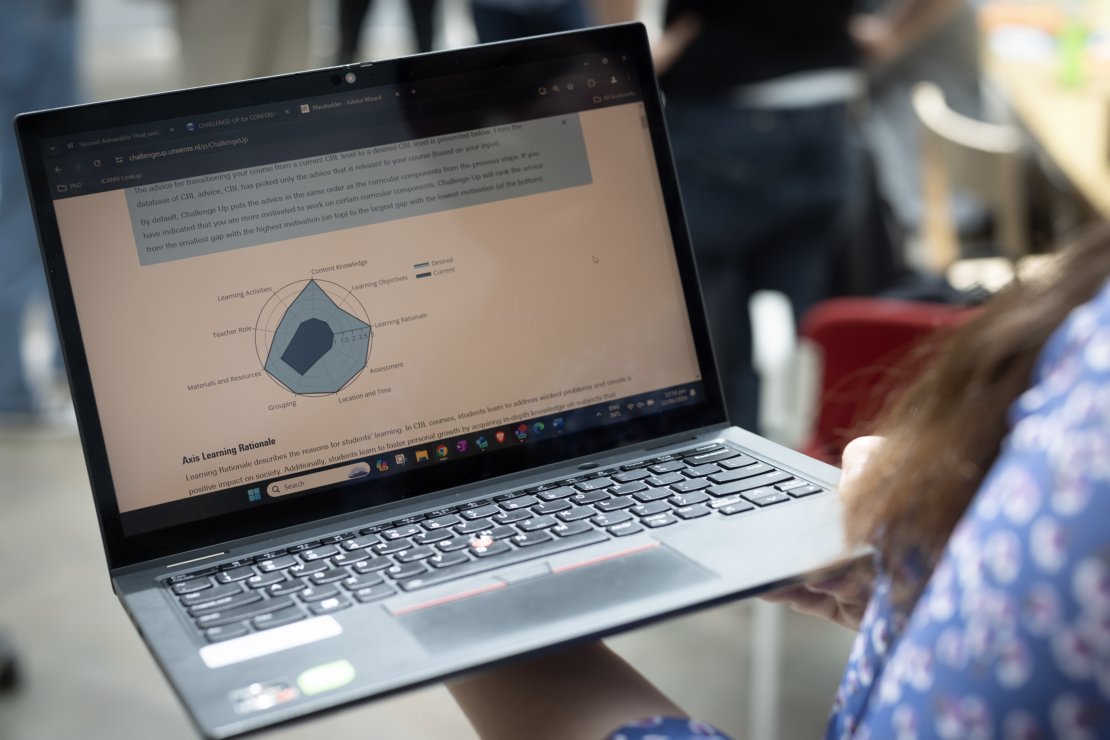
- Learning, connecting and inspiring at ECIU Forum
Last week, more than twenty UT employees and students travelled to Kaunas, Lithuania, to participate in the first Forum of ECIU. The two day event was packed with workshops, discussions and inspiring sessions to lay the foundation for future collaborations between the 14 member universities. UT employees Irene Wols and Nikola Nizamis were there.
Both Nizamis and Wols were impressed by the warm welcome. ‘Despite my somewhat active involvement in ECIU activities in the past years, I do not know many people within the network,‘ says Nizamis, who is a lecturer in humanitarian engineering. ‘However, I felt very welcomed and had the feeling of being part of a community of people with the same purpose: Connect for life. Irene Wols, PhD Candidate Transdisciplinary Education, was impressed by how well it was organized. ‘The laser show during the opening ceremony set the tone for the rest of the Forum, engaging and just a bit different from what you would expect.’ (text continues below photo)
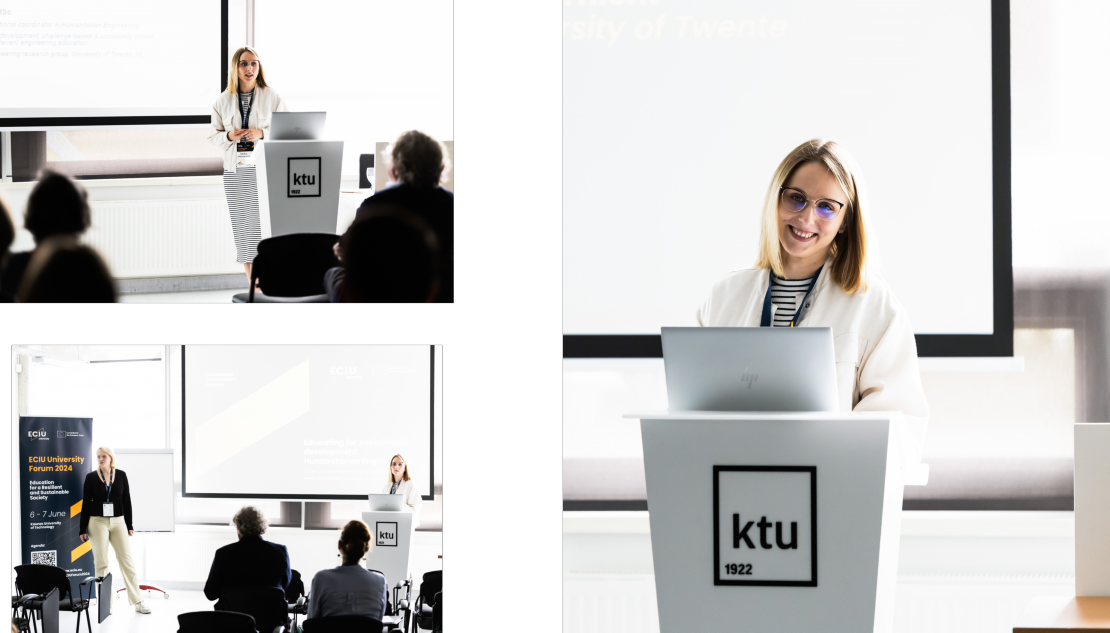
Nikola Nizamis, lecturer in humanitarian engineering, at ECIUs first Forum
Set at Kaunas University of Technology (Kaunas, Lithuania), the forum brought together over 210 participants from 14 ECIU University member institutions, and the delegation from Ukraine as special guests. More than 80 teachers, 70 staff members and 60 students arrived for two days of unique workshops, passionate discussions and inspiring presentations – with 38 parallel sessions taking place.
EXCHANGE IDEAS
With Education for a Resilient and Sustainable Society chosen as this year’s topic, the Forum asked many questions – and offered more than one way to find an answer. As participants travelled between three venues and diverse sessions, they used this opportunity to exchange ideas and seek new solutions.
‘At ECIU University, we come together to find answers to the most pressing challenges our society is facing,’ reminds ECIU University director Sander Lotze. ‘And finding answers is not something we can do by ourselves – it's something we should do together’.
COLLABORATION
According to Nizamis, the meeting brought many opportunities for collaboration. ‘There was plenty of time for networking with colleagues from different universities and discuss potential future collaborations which I considered particularly valuable for me as an academic staff.’
Wols facilitated a workshop. ‘I loved how engaged the participants were, this will help me a lot in further developing this workshop. Beside that I got mostly inspired by the workshops and presentations, nothing that I can apply immediately, but to keep in mind for the long term.’ (text continues below photo)

Irene Wols, PhD Candidate Transdisciplinary Education, gives a workshop at Forum 2024
In between the sessions, participants took time to connect and share their ECIU University stories. Nizamis: ‘As a member of UT, I was also very thankful to connect with colleagues from my own university. This event allowed me to learn about what is happening at UT, learn about the research and educational activities of my colleagues and the challenges they are facing within the same academic system, and even explore possibilities for collaboration. It was also very refreshing to interact with them in a less formal setting, beyond the usual professional context.’
Wols: A big advantage was to connect with colleagues from other universities that are interested in similar topics, especially in a more informal way through the community oriented atmosphere created by the Forum.’
Curious about ECIU? Check out the website and get inspired.
- Challenges open for application
France will host the Olympic Games this summer. Our French partner INSA has developed an interesting challenge and invites UT students to participate. Challenge providers are Decathlon, Toyota Motors and Mission Bassin Minier. A perfect opportunity for a short exchange.
During the five-day challenge in Valenciennes you will devise and design innovative, technical solutions for sports practice. You do this together in an international team of students. You and your team will then present the final product to a jury and you also have a chance to win an entrepreneur award.
More info, deadlines and programme
For more information and for the full program, click here.
Decide quickly, the deadline for registration is Thursday 6 June. The challenge runs from June 24 to June 28.
Challenge providers are Decathlon, Toyota Motors, Mission Bassin Minier.
If you have any questions about possible travel allowances, please contact our mobility officer, Yael Veenstra Konzizky.
Look for more interesting challenges here or sign up for the ECIU newsletter to always be the first to receive the latest learning opportunities.
The University of Stavanger, Norway, invites students to participate in the challenge adultcentrism in educational relationships.
This challenge focuses on an often unseen dimension of diversity and inclusion, namely 'age', specifically 'underage age'. The adult-oriented bias can create barriers in recognizing the abilities of children and young people. They are often seen as 'incompetent' or 'not yet developed' because of their age.
You will work together in an international team, doing so part-time, digitally, over a period of three months and you will attend the University of Stavanger for five days.
More info and programme
For more information and for the full program, click here.
Decide quickly, the deadline for registration is Monday 10 June. The challenge runs from September 5 to November 14.
If you have any questions about possible travel allowances, please contact our mobility officer, Yael Veenstra Konzizky.
Look for more interesting challenges here or sign up for the ECIU newsletter to always be the first to receive the latest learning opportunities.
- Innovation to EU Erasmus+ Pilot projects
The European Consortium of Innovative Universities (ECIU), of which is UT a partner, is participating in 2 out of 10 Erasmus+ pilot projects. There will be joint online event, organised by European Commission, on 29 April, that will present the results of these projects. So ECIU community, HE experts across universities, ministries on other partners are welcome to join. Registration is open until 22 April, more information below.
We invite you for an exclusive look into the future of higher education. In the wake of the adoption of the Commission’s Communication on a blueprint for a European degree, this is your chance to hear from the trailblazing Erasmus+ pilot projects that have spearheaded efforts in the seamless delivery of joint degree programmes and the establishment of a possible European legal status for alliances of higher education institutions. Their work was the basis of the Commission’s work on a blueprint for a European degree, presented on 27 March.

This event is co-organised by all Erasmus+ pilot projects and the European Commission. It will feature representatives from the pioneering Erasmus+ pilot projects, Member States, the wider higher education sector and European Commission. They will share their insights and experiences in bringing these initiatives to life.
The event is an opportunity for national and European policymakers, as well as for rectors, academic and administrative staff of higher education institutions, students and representatives of the wider higher education and business sector to engage in discussions on the necessary steps to make a European degree a reality.
Don’t miss out
Join us online on 29 April as of 9:00 AM.
You can find the full programme here.
Please register here by 22 April 2024.
Your registration will be final only upon receipt of a confirmation email including the online connection details.
For any further information, please use smartt@uam.es.
We look forward to seeing you all!
Projects ECIU university participates in
· ESEU – a possible European legal status for alliances of higher education institutions
· FOCI – the joint European degree label.
- Team impact award
A Team Impact Award will be given during the ECIU University Forum in Kaunas on June 6-7th, to show the entire community the impact of the challenge you completed. Whether you're a learner, a teacher or a researcher, you're welcome to apply. The organiser is ECIU University, a network of 14 European universities of which UT is a partner.
The ECIU Impact Framework aims at helping you tell your individual and collective impact story: Look back and capture the rich nature and power of impact you’ve made. Look forward to inspiring and informing further impact and learning. Your impact story can make a difference, and we want to hear all about it.
Let your creative juices flow! Make a video (3 minutes max, any format) that best showcases the impact you and your team made during the ECIU University challenge/action.
Some questions and food for thought
- What concrete impact have I/we made through this ECIU University challenge/action.
- Have I/we succeeded in making the impact I/we initially wanted to make when I/we started the challenge/action?
- What impact has this ECIU University experience had on me as an individual/on us as a team?
Send your video (or the WeTransfer / YouTube link) by the 15th of April to: Barbara Moore (INSA Toulouse): barbara.moore@insa-toulouse.fr, and Daria Bobovkina (Lodz University of Technology): daria.bobovkina@p.lodz.pl
What are the prizes?
- An all-expenses-paid trip to the ECIU University Forum in Kaunas for 4 lucky winners!
- Your video shown during the ECIU University Forum, the biggest and most impactful ECIU University event of 2024 with over 200 attendees!
- An interview on the ECIU website, to share your impact with the whole World.
- Visibility on ECIU social media about the work done on societal challenges (and digital certificate).
SELECTION PROCESS
The winning team will be chosen by WP5 Community Coordinators Group composed of 1 member per ECIU University institution between 15th of April – 30th of April. The team selected for the award will be contacted by 5th of May.
SELECTION CRITERIA
Selection criteria
There are 3 criteria for the selection:
- Evidence of the overall impact made (qualitative and quantitative).
- Teamwork and synergy showcased in the video.
- Creative approach to the video itself.
If you have any questions, contact Barbara Moore (INSA Toulouse): barbara.moore@insa-toulouse.fr, and Daria Bobovkina (Lodz University of Technology): daria.bobovkina@p.lodz.pl
- ECIU University teacher connect webinar
Are you a teacher interested in interdisciplinary, cross-border collaboration in innovative education? Well, here’s your chance to meet some colleagues and explore potential matches! We invite you to an informal 1-hour lunch session with teachers around the ECIU University, the European Consortium of Innovative Universities of which University Twente is a partner.
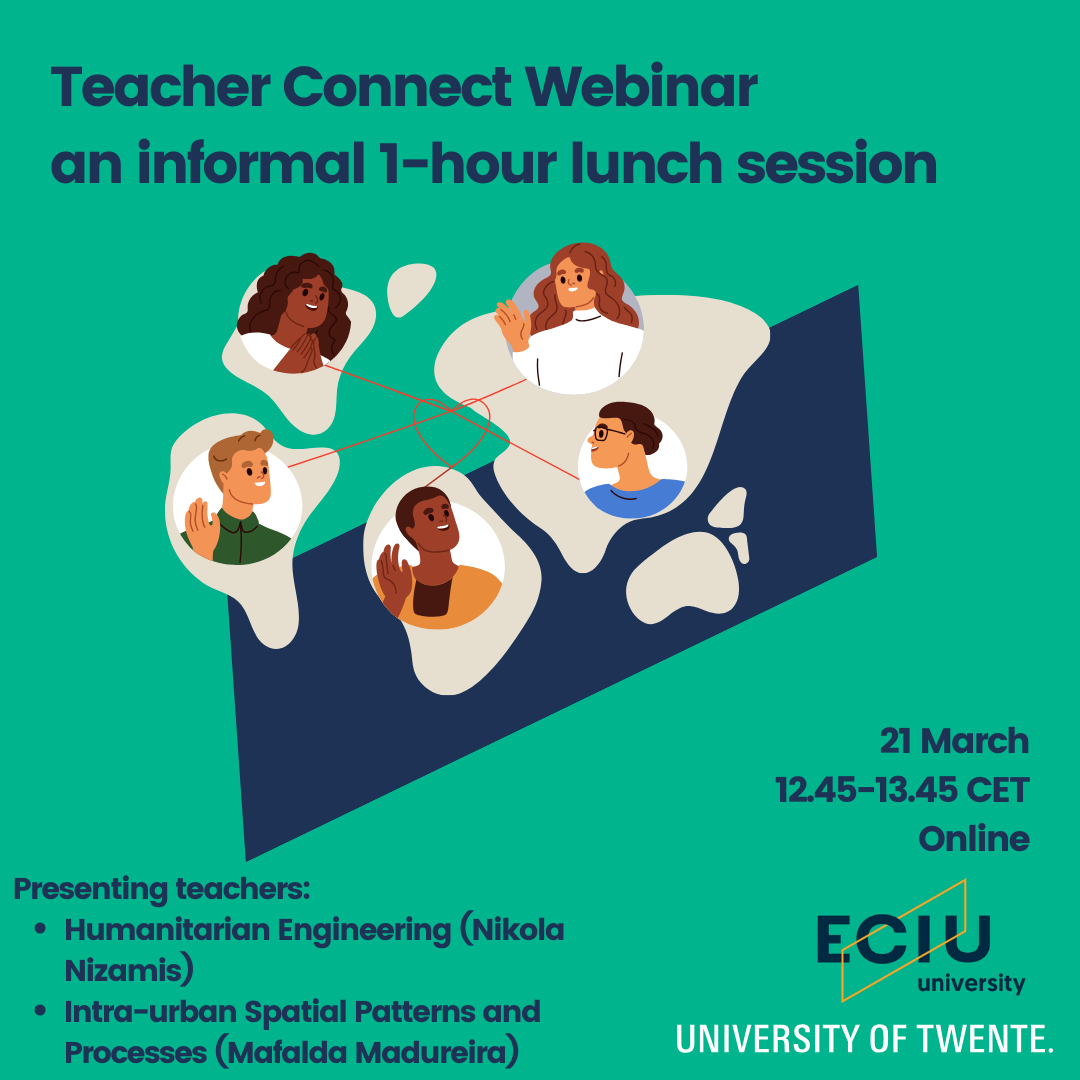
The Teacher Connect is aimed to help teachers interested in the ECIU University, with its new educational model, connect with each other and explore potential links with other teachers who wish to collaborate on courses, challenges, or micromodules.
Two teachers from the University of Twente will present their courses and afterwards, we will guide a discussion around opportunities for collaboration, spin-offs, and possible exchange for your students.
The two courses presented in this first Teacher Connect will be:
👷 Humanitarian Engineering with Lecturer Nikola Nizamis
o This course introduces students to the field of humanitarian engineering through co-designing socio-technological solutions with external stakeholders that address one of the challenges the world has faced. These challenges, including growing populations lacking access to fundamental resources, require innovative, appropriate technological solutions. A new generation of engineers need to be equipped with skills and abilities to work in challenging, volatile, and complex societal contexts defined by social, cultural, and economic constraints.
🌆 Intra-urban Spatial Patterns and Processes with Assistant Professor Mafalda Madureira
o This course explores the socio-spatial inequality challenges that impact both the urban environment and the quality of life of urban residents. We focus on capturing and understanding diverse forms of knowledge related to intra-urban variations in quality of life, including socioeconomic status and health. Through a challenge-based learning approach, students identify a learning path to solve socially relevant challenges related to urban quality of life and well-being.
Join us here for this lunch session on 21 March, from 12.45-13.45 CET to learn more about these two exciting courses and possibilities to collaborate.
- Adapt existing legal structure most feasible way
European legal status needed to overcome obstacles in transnational collaboration of higher education
Last week, nearly 200 colleagues from all over Europe gathered online and in Brussels to discuss the way forward for a European legal instrument serves the needs of higher education institutions. There was broad agreement about the need for such an instrument in transnational collaboration. Different key stakeholders and policy-makers reflected on the topic.
Led by ECIU University, the ESEU-project (which stands for European Status for ECIU University) was one of the four Erasmus+ legal policy experimentation projects that tested and implemented institutionalised EU cooperation instruments.
Daniela Craciun, ESEU-project manager and Assistant Professor of Higher Education Policy at the University of Twente (CHEPS), presented the main outcomes of the ESEU-project. She described eight concrete use cases illustrating the need for a legal status. The ESEU-project also conducted 11 interviews with national higher education ministries. The analysis of the national context showcased that member states still need to better understand the work of European University alliances, their challenges, and their needs. (text continues below pictures)
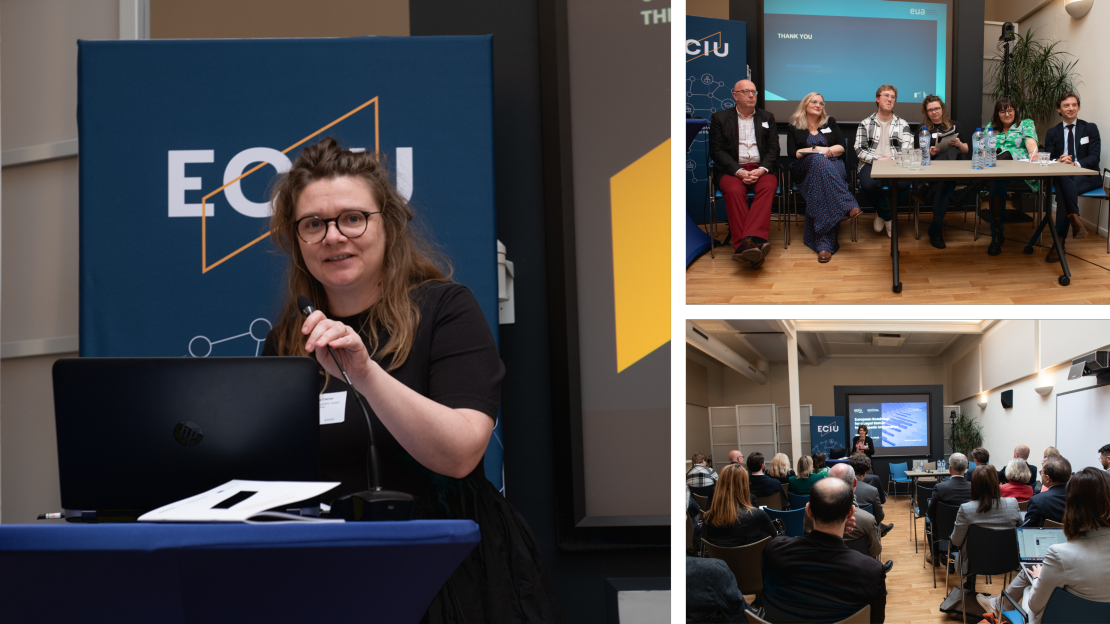
Craciun ended her contribution by making recommendations for the road ahead. While the set-up of a fully tailored instrument dedicated to transnational collaboration of higher education institutions is the ideal scenario, the most feasible way forward is the adaptation of an existing legal structure like the European Grouping of Territorial Cooperation (EGTC).
The preliminary findings of the Erasmus+ pilot projects, as presented by Tine Delva, European Commission Deputy Head of Unit Higher Education (DG EAC), show that none of the existing legal instruments fully correspond to the identified needs of higher education institutes. Delva announced that the European Commission will mention the legal status in its upcoming higher education package, planned for April 2024.
The seven recommendations to improve the EGTC, and much more information, can be found in the ESEU final report: the Roadmap on a European legal instrument for transnational higher education cooperation on the eciu.eu website or here.
- Easy way of student mobility
Fabian Krüger is a master's student in Mechatronics at Hamburg University of Technology. At the moment, he is doing a one-year Erasmus exchange program at the University of Twente. Both universities are partners of the European network ECIU University. Krüger participated in two challenges of this network.
'The very first contact with Enschede came through the CuriousU summer school. I participated with great pleasure and my current exchange actually resulted from that. Twente was already a bit familiar territory.'
 Together with friends, he participated in the student think tank Create Tomorrow under the banner of ECIU University. 'The organisation had set up a parallel programme for students of ECIU University. We got an introduction, extra workshops, there was a pub quiz and other activities. In addition, we worked together in groups on a challenge in a beautifully decorated tent, in the middle of the UT campus. That was a good set-up.'
Together with friends, he participated in the student think tank Create Tomorrow under the banner of ECIU University. 'The organisation had set up a parallel programme for students of ECIU University. We got an introduction, extra workshops, there was a pub quiz and other activities. In addition, we worked together in groups on a challenge in a beautifully decorated tent, in the middle of the UT campus. That was a good set-up.'Different backgrounds
Krüger is currently following the challenge Intercultural Competences: Guiding Practical Insights through Citizen Science. 'It's great to work with people who have a different cultural background as well as a different educational background. And through challenge-based learning, you come into contact with new teaching methods.'
Easy way
According to the master's student, the ECIU University offers an opportunity to gain international experience that does not require much preparation. 'I've been on exchange for a year now. That requires some effort to arrange everything. If you don't have that time, the ECIU University is an easy way of student mobility, to get in touch with students from other European countries, to collaborate and to visit another university abroad. It's all in there.'
Tosti Talk
- Would you like to know more about what ECIU University has to offer you? Then come to the Tosti.Talk, next Tuesday 27 February at 12:30 pm in the DesignLab.
- Want to experience ECIU University challenges immediately? Then go to the website, register and shop among the challenges and learning opportunities. Enjoy!
- Stay tuned: Subscribe to our newsletter
- Lunch & Learn
- How to make your E+ proposal strongerThe European Consortium of Innovative Universities (ECIU) organises an online Lunch and Learn about Preparing a successful Erasmus+ proposal on Wednesday February 14th. Join this session to hear some hints and tips from Erasmus+ evaluators from across ECIU of which UT is a partner.
- ECIU University strives to enhance and facilitate joint funding proposals from different ECIU institutions, creating strong consortia to achieve results that have an impact on European society.Writing a successful Erasmus+ funding proposal does not only require careful planning and attention to the call and application form details, but it also needs to take into account the way the evaluators will “scan” your proposal and the answers to the evaluation questions they will search in the paragraphs of the proposal .Get some useful suggestions during your lunch with some presentations from Erasmus+ evaluators! Let’s meet and discuss with them, let’s be inspired to make ECIU proposals more convincing.Wednesday February 14th 12.00 - 13.00 CEST. Here is the link to connect.
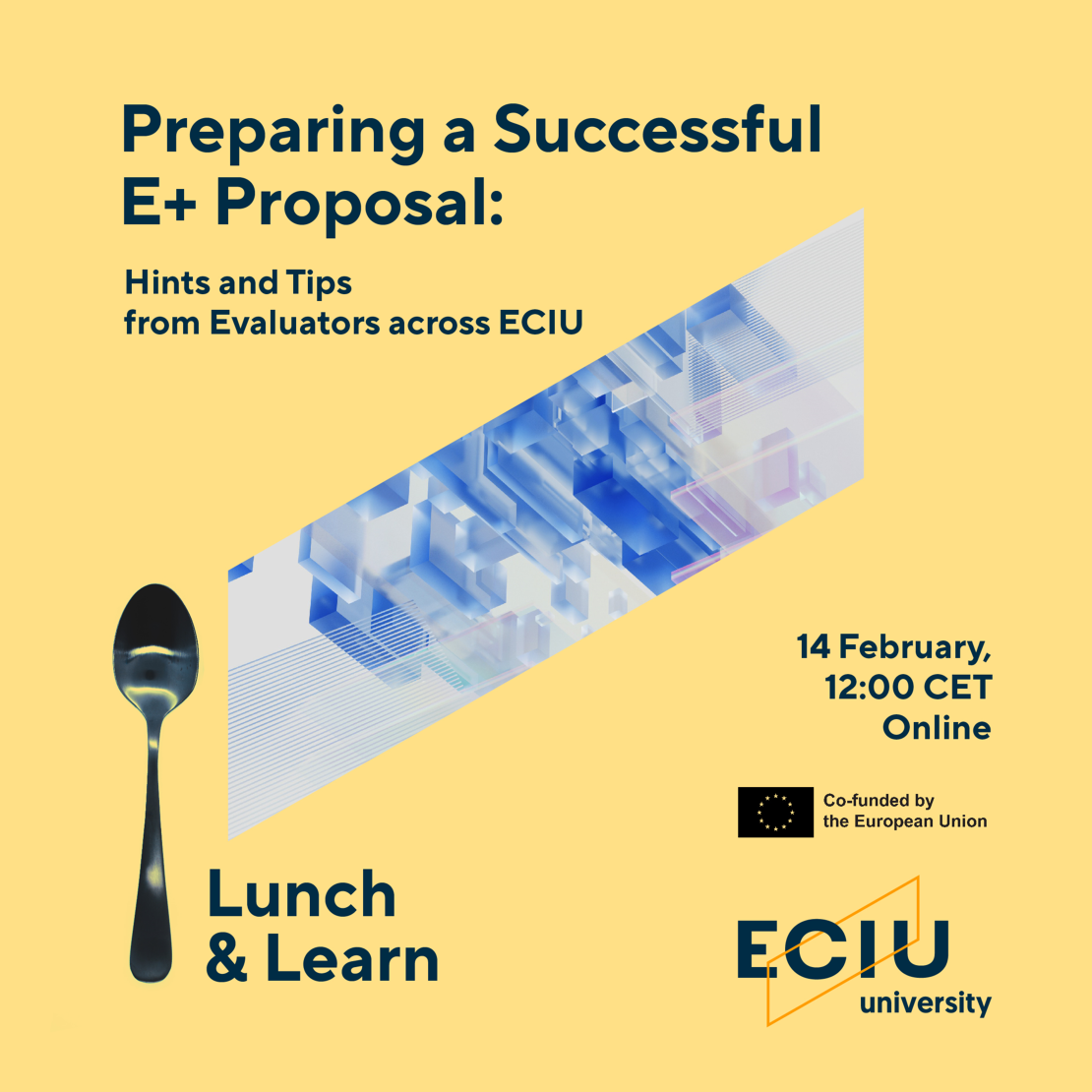
- Forum ECIU University
Join the ECIU University Forum in Kaunas, Lithuania, on June 6 and 7. Debate, discuss and think along with this year’s theme Education for a resilient and Sustainable Society. The two-day intensive and interactive event strives to generate ideas, establish new relationships between ECIU University community members, and encourage educational collaborations. The meeting will highlight the potential and opportunities the ECIU University ecosystem offers, deepen connections within the educational community to build a sustainable society, and inspire teachers, researchers, learners, and external stakeholders to foster creativity and enthusiasm for challenge-based learning while sharing their expertise, knowledge, and best practices. (Text continues below picture)
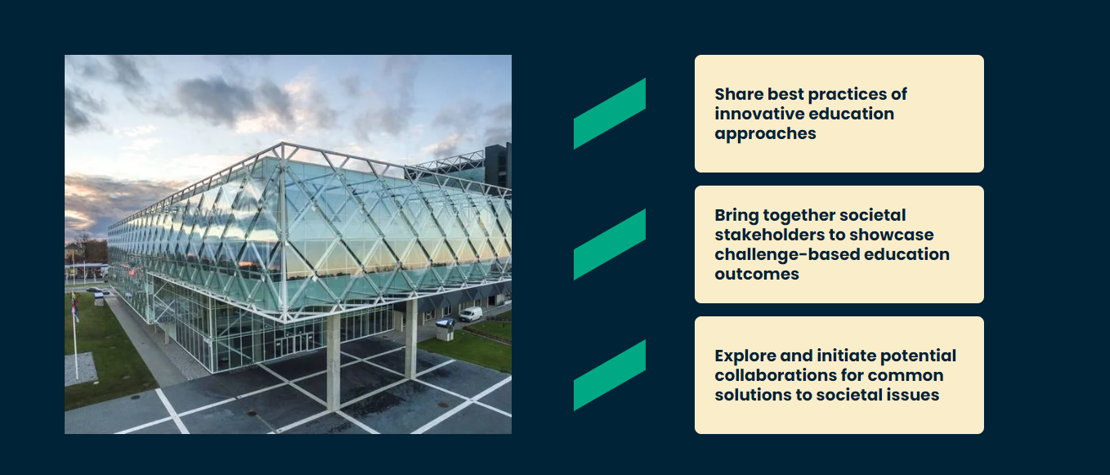 The Forum is a yearly networking event that brings together the entire ECIU University community – focusing on learners, teachers, staff, and researchers. Deadline to apply for participation is the 29th of February.Register here.Sign up quicklyPlease note: only 230 people will be able to attend. ECIU University member institution can select and financially support up to:· 6 students (including 2 student ambassadors)· 5 administrative staff members· 5 teachers/researchersSing up quickly and compete for one of these available spots 😉.The selection will be done at member institution level (WP5 and Institutional Coordinators responsible), participants confirmed around early April.
The Forum is a yearly networking event that brings together the entire ECIU University community – focusing on learners, teachers, staff, and researchers. Deadline to apply for participation is the 29th of February.Register here.Sign up quicklyPlease note: only 230 people will be able to attend. ECIU University member institution can select and financially support up to:· 6 students (including 2 student ambassadors)· 5 administrative staff members· 5 teachers/researchersSing up quickly and compete for one of these available spots 😉.The selection will be done at member institution level (WP5 and Institutional Coordinators responsible), participants confirmed around early April. - Community of practice
ECIU is launching a new initiative to support experienced challenge-based learning teachers and micromodule teachers in efforts to set up, deliver and evaluate challenges and micromodule courses. An informal, interactive Community of Practice across partner universities has been set up. The first sessions will take via Zoom on 1 Feb at 16:00.
 After that, the plan is to have a session every month. Each meeting will be open to every practitioner who is interested in being inspired, exchanging ideas, honing skills, and solving problems. It speaks for itself that there is no community without YOU. So come and join us!
After that, the plan is to have a session every month. Each meeting will be open to every practitioner who is interested in being inspired, exchanging ideas, honing skills, and solving problems. It speaks for itself that there is no community without YOU. So come and join us!Here below you find the ECIU invite and link. Please register here so that we have an idea of the numbers.
We´re looking forward to seeing you there!
Warm regards,
The ECIU-team at UT
Creating a community
Calling all ECIU Challenge Based Learning and Micro Module practitioners
Have you ever wanted to discuss the challenges of CBL with another experienced teamcher? Would you like to find out how other teachers have dealt with issues you have encountered? Do you wonder how the design of your Micro Module could be enhanced and would you appreciate feedback from other MM teachers?
During a Focus Group meeting last summer, one of the main findings was how useful the session had been, meeting up with other experienced CBL and MM teachers and exchanging stories. So, we are very happy to announce that we will be launching a Community of Practice for CBL and MM practitioners like yourselves at 16.00 CET on 1 February 2024.
The basic idea is to meet once a month to discuss specific issues. Each month one (or two) practitioners will present a specific issue they have encountered, compare experiences with the rest of the community and together discuss possible strategies and/or solutions.
At the launch meeting, where we will also discuss the format of the Community, the schedule, its name etc., we will present the outcomes of the Focus Group. This should serve as a springboard for the first few meetings, at least. The idea is decidedly not a formal, seminar-type structure or a showcase for best practices, but rather an informal get-together of colleagues to share experiences, exchange ideas and build connections.
Our first meeting will be on 1 February 2024 at 16.00 CET
Come and join us on Zoom at this link.
During the launch meeting we will use Doodle to fix a regular time for these monthly meetings, if you can’t be present but would like to participate in the Community, please drop us a line and we can send you the link to the Doodle.
Looking forward to seeing you soon,
Vânia Carlos and Kate Riley
- Erasmus + event
SHARE RESULTS AND EXPLORE NEW COLLABORATIONS
ECIU University is organising an online event on Erasmus+ projects for all partner universities on Wednesday 17 January. The aim is to update each other on results, new initiatives and explore future cooperation.
The online event will start with a plenary kick-off. Sophie Ball from Dublin City University, and chair of the Educational Cooperation Policy and Programmes Group (EduCo), will give an introduction to EduCo's support. There will then be a short presentation of the projects, which can then be followed in so-called break-out rooms.
This event aims to bring together Erasmus+ project coordinators from across the ECIU consortium to promote their project results and invite researchers to hear about the latest Erasmus+ projects, allowing them all to connect with each other for possible future proposals.
Three UT employees talk about their project. Assistant professor Klaas Stek will talk about the project PRECIUS, which stands for PRocurement Educational Consortium for Innovation-sourcing Using Sustainability. Sjoerd de Vries and Robert Muster will talk about the Managing Digital Transformation project.
Participation in one of the 10 breakout rooms will give you the opportunity to hear details about three to four Erasmus+ projects and ask questions.
Click here for more information, registration and the list of all projects.
- Smart education
The University of Stavanger, partner of ECIU, is organising an on-site workshop from Wednesday 31 January to Friday 2 February for teachers who want to learn more about challenge-based learning and other innovative teaching methods.
The focus will be on how ECIU can develop smart education.
Registration is open until 22 December. Check the website for more information and registration.
A mobility grant per partner university is available for two people. Please note that this registration does not guarantee selection.
- Creathon
The municipalities of Linköping (Sweden) and Enschede (Netherlands) offered two challenges during de ECIU University Creathon 2024: building digital cities of the future. About 45 eager European students from the 13 ECIU University member institutions participated in the event that took place at Linköping University (LiU), last month.
Both challenges revolved around how municipalities can effectively communicate community and crisis information to their residents, a growing problem observed by both Linköping and Enschede.
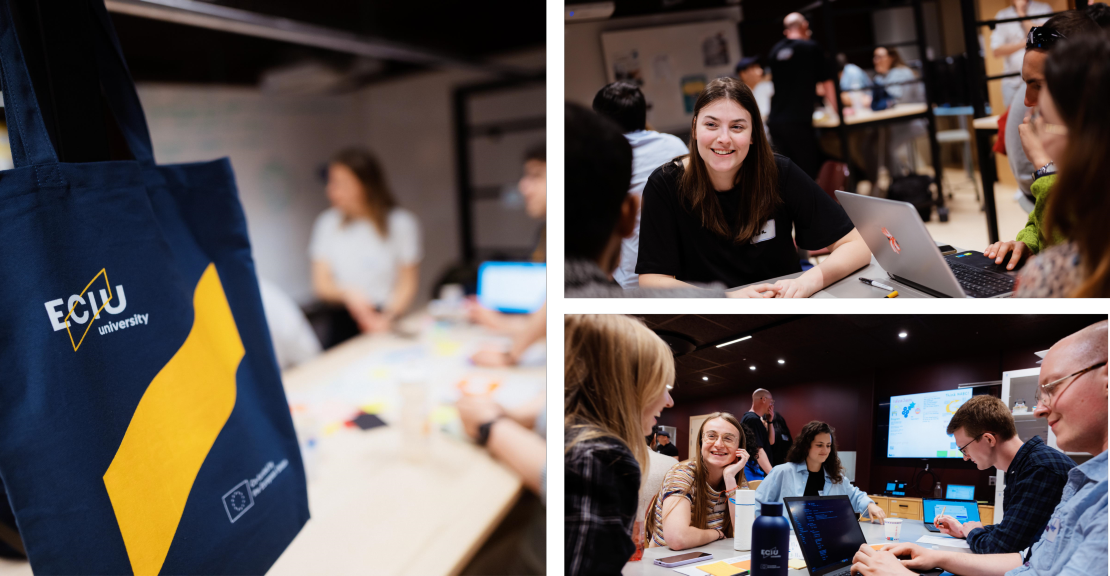
Students formed various working groups of about five people, with many coming from different backgrounds and studying different higher education programs. They chose which challenge to concentrate on and over three days developed a proposal they presented to a jury. They also had the opportunity to attend various lectures on topics such as pitch training, starting a business, a solution-oriented model called NABC, and participated in several social activities in the evenings.
Susanne Fuentes Bongenaar (University of Twente) said it was educational to experience a new university that offers ideas on how to develop your city and use innovations that currently don't exist. ‘You compare a lot when you come to another university, and the innovations in Linköping are original and interesting. There's a lot of inspiration I can use now when I return to my university and the projects I'm involved in.’
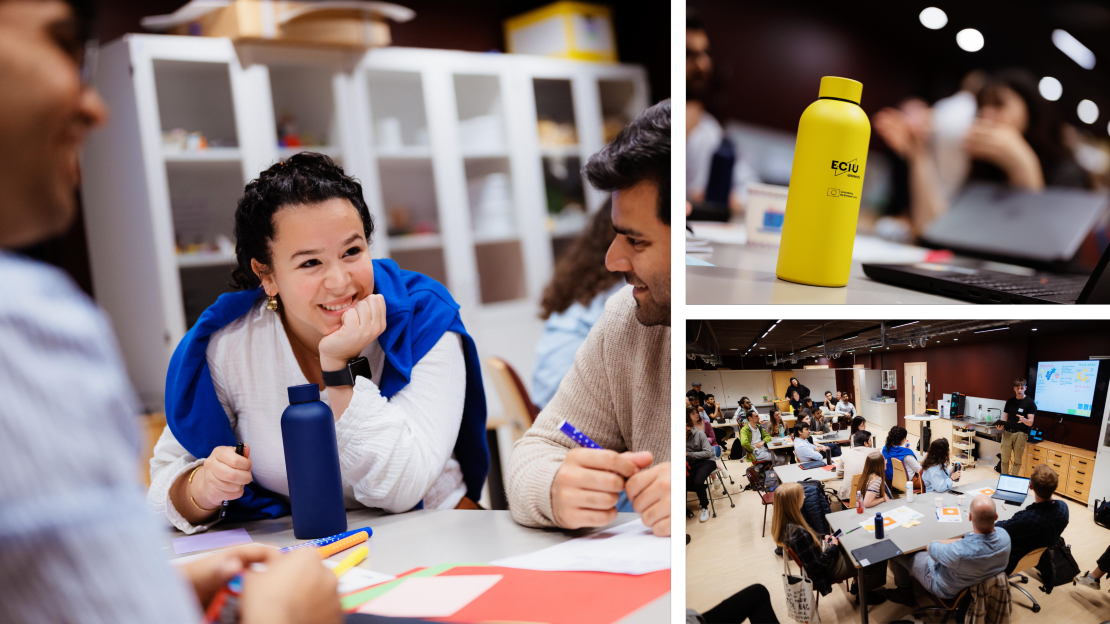
ECIU University offers students the opportunity to experience a new way of thinking and learning through challenge-based learning. They can choose from various challenges or micro-modules which take place digitally, on-site, or are a combination of both. You can explore these opportunities through the engage platform.
Watch te recap video here ⬇️
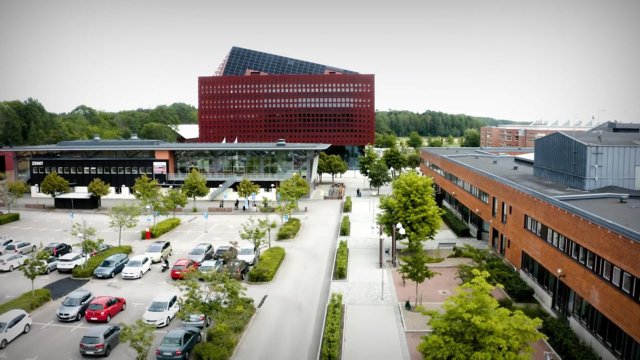
- Workshop on challenge-based learning Stavanger
Some 35 educators from the ECIU University network explored innovative teaching methods at University of Stavanger last week. participants from the University of Twente were Marcel Bijman, Wim de Boer, Thomas Groen, Kishore Sivakumar and Svenja Damberg.
The on-site workshop gathered participants from all 13 ECIU University partners, and was the first of its kind. The workshop aimed at deepening participants’ understanding of challenge-based learning (CBL), equipping them with new skills and innovative teaching methodologies, and fostering a sense of community among ECIU academic staff.
CBL is the main pedagogical framework used at ECIU University, which offers real-life challenges, micro-modules and short-term mobility to students in partner universities. 'It was a wonderful workshop, I got so much out of it', said Clare Gormley, a participant from the Teaching Enhancement Unit at Dublin City University (DCU).
(Text continues below photo)
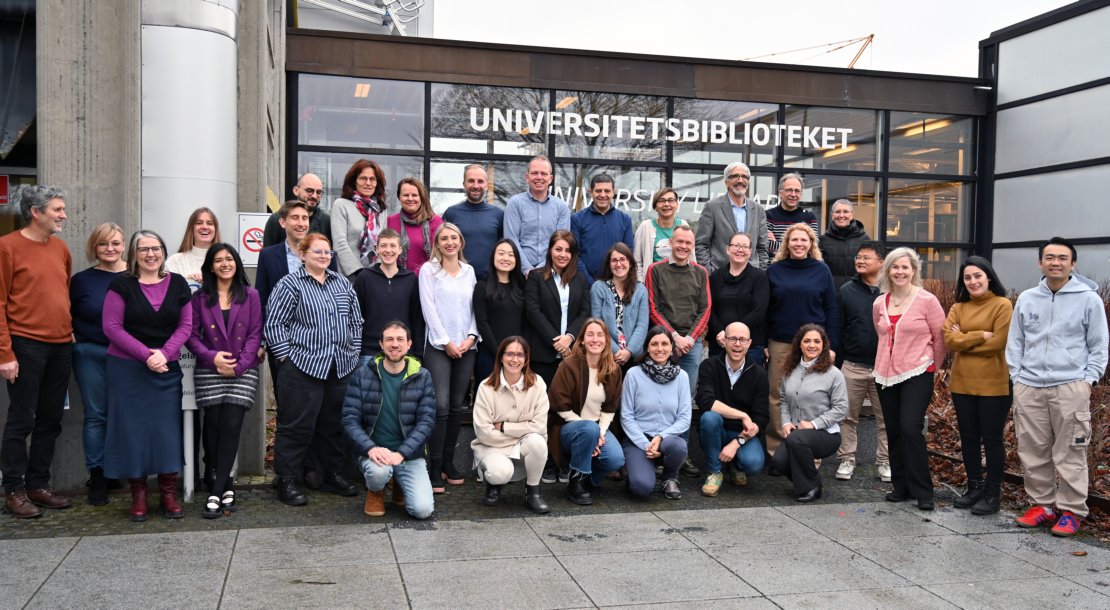
Over three days, the educators developed innovative ideas for teaching using CBL, the same pedagogy they use when teaching students. The sessions encompassed an introduction to the challenge, team formation, guided brainstorming activities and tools, collaborative teamwork sessions, sharing CBL experiences, presentation of results, and a wrap-up. At the end, the teachers presented solutions they had developed through teamwork. 'It was a fantastic opportunity to walk in the shoes of students, to feel the challenges one experiences when working in groups, and to work with staff and learn from each other,' said Gormley.
(Text continues below photo)
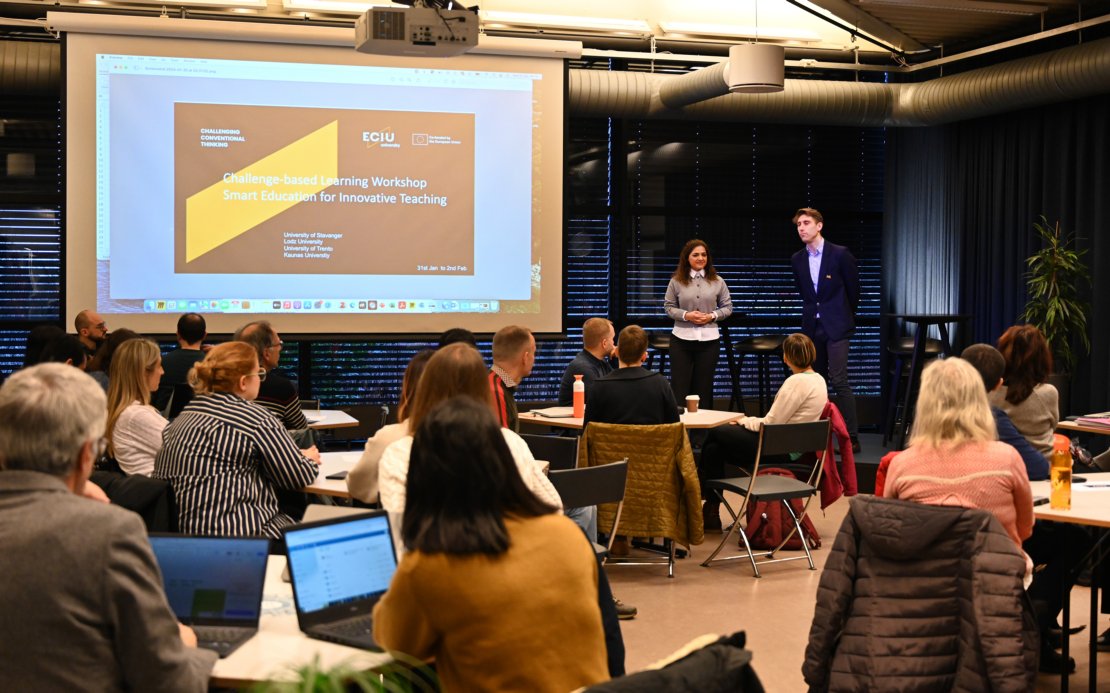
'The most rewarding part was the interaction with other staff who apply CBL in all its forms. It was very inspiring to find out how they do it and learn new techniques, because everybody knows some but nobody knows them all. Also, facilities at UiS were fantastic. They stimulated creativity, said associate professor Thomas Groen from University of Twente.
The workshop was facilitated by Masoumeh Shahverdi (University of Stavanger), Asta Daunoriene (Kaunas University of Technology), and Joanna Miłosz-Bartczak (Lodz University of Technology), who brought their extensive experience and expertise to the event.
- EU Commissioner opened the ECIU extended reality campus
On Monday, 20 September, EU Commissioner Mariya Gabriel opened the ECIU University Extended Reality (XR) Campus. The opening was streamed to YouTube. “It is a great example of what we can accomplish when we pool resources,” said Commissioner Gabriel. Via the Campus, learners have an environment to continue learning and have people interacting with each other, even at a distance.
The Extended Reality (XR) Campus was developed by Zoan, a creator of virtual worlds, in close collaboration with Tampere University, one of the ECIU partner institutions. After the Commissioner opened the Campus, Miikka Rosendahl (CEO of ZOAN) presented the future of XR technology. Professor Henri Pirkkalainen (Tampere University) presented how the XR Campus is used himself and learners to solve a real-life challenge of Tampere City. The event closed in a Challenge Room, where learners were working together to solve a challenge of Tampere City: “It is like we are working face to face”, said one of the learners about her experience of using the XR Campus as a tool in her learning. After the opening, the ECIU Community from all over Europe joined the XR Campus and met in virtual reality. No distance keeping was required.The XR Campus is ECIU University in virtual reality. The Virtual Campus is a huge milestone for the European educational community as it provides instant collaboration opportunities throughout Europe. Learners, teachers, researchers, and societal actors can access the Campus anywhere and anytime to immerse in interaction and co-creation fully. Challenges can be solved together, and the VR environment offers all kinds of opportunities for skills and competence development. People feel psychologically immersed as if they were physically present in the same space.
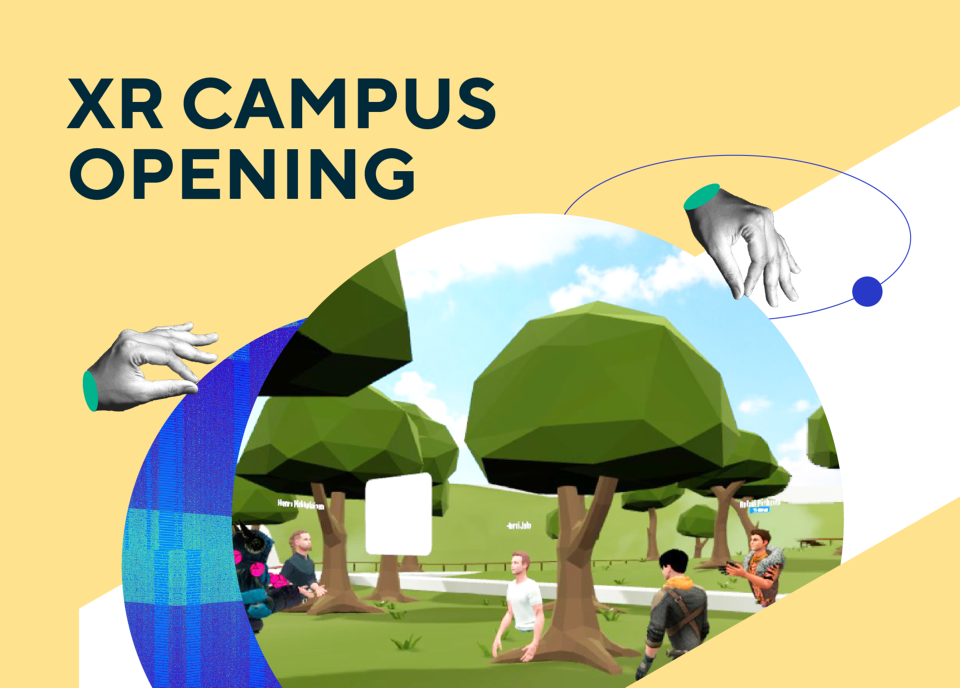 Building up a European university is all about experimenting and pioneering. With this pilot, ECIU University shows that the future of European collaboration in higher education is all about connecting our campuses and their communities. ECIU University is excited to find out how new VR technologies will enable us to work and learn together across borders.ECIU University will change the way of delivering higher education by its ground-breaking and innovative education model. ECIU University is an EU-funded initiative of the alliance of 12 universities. Learners, teachers, researchers, enterprises, NGOs, public stakeholders and citizens solve wicked multi-disciplinary challenges in the spirit of continuous learning. The aim is to transform traditional degree-based education into challenge-based. The for everyone accessible XR Campus will be a tool for working with stakeholders and challenge-based education, together with colleagues from all over Europe, naturally and innovatively.
Building up a European university is all about experimenting and pioneering. With this pilot, ECIU University shows that the future of European collaboration in higher education is all about connecting our campuses and their communities. ECIU University is excited to find out how new VR technologies will enable us to work and learn together across borders.ECIU University will change the way of delivering higher education by its ground-breaking and innovative education model. ECIU University is an EU-funded initiative of the alliance of 12 universities. Learners, teachers, researchers, enterprises, NGOs, public stakeholders and citizens solve wicked multi-disciplinary challenges in the spirit of continuous learning. The aim is to transform traditional degree-based education into challenge-based. The for everyone accessible XR Campus will be a tool for working with stakeholders and challenge-based education, together with colleagues from all over Europe, naturally and innovatively. - Teacher Hub
If you´ve heard of the Teacher Hub but have been wondering what all the buzz is about, let us introduce it to you. The Teacher Hub is the virtual ECIU*-wide Teams environment for teachers by teachers.
Being a member of the Teacher Hub helps you
- Stay informed on the latest ECIU news and events
- Have access to interesting educational materials related to Challenge-Based Learning (CBL) and MicroModules (MM)
- Get inspired by CBL success stories
- Connect with colleagues on The Meeting Place for Teachers, our informal discussion board
- Collaborate with colleagues on issues related to CBL and MM

ECIU offers support to teachers at every level of experience by organising online and f2f workshops, trainings and events, all of which are shared on the Teacher Hub. In addition, the CBL Community of Practice uses the Teacher Hub´s discussion board to share the outcomes of their monthly meetings. You´re welcome to join them, every last Wednesday of the month. You can also find the contact data of each ECIU institution´s Educational Support Manager on the Teacher Hub in case you´d like to connect directly with one of the many ECIU-institutions.
'If you´re a teacher working with or interested in Challenge-Based Learning and MicroModules, and you enjoy being engaged in international, transdisciplinary collaboration, the Teacher Hub is a one-stop-shop for support, training, and inspiration', says Mieke Beurkens, Teacher Hub Manager.
Sign up here to join us: https://www.eciu.eu/eciu-university-teacher-hub
Requests or comments
Please don´t hesitate to contact the team behind the hub with requests or comments, to share ideas or ask questions on the discussion board, and to reach out to your colleagues across the ECIU-institutions.
At ECIU, we provide the basic structure for the Teacher Hub, but we need you as active members to turn the platform into a thriving space for collaboration.
- 2023
- A game-changing unversity
In 2030, ECIU University of which the University of Twente is a member, will solve multi-disciplinary societal challenges in entrepreneurial, innovative ways. Last week, the Board adopted the vision for ECIU University 2030, confirming a long term strategy that the university will bring together learners, teachers, researchers, companies, public sector, NGOs and regional ecosystems throughout Europe. UT-president Victor van der Chijs is also the president of this Board.
The adopted vision describes how ECIU University will be a game-changing university and will pioneer as a challenge-based university at the European level. The university is based on the needs of society. It solves challenges and reskills the workforce to ensure significant societal impact. Sander Lotze, Director ECIU University: “The vision underlines that the ambitions stretch much further than only the project. We commited ourselves on a joint process towards impactful innovative education and research at the European level.”Upskilling and Reskilling the workforceECIU University is a European university without degrees. Research-based micro-credentials, offered throughout Europe, are the core of personalised skills and competence development of its learners. ECIU University flexibly upskills and reskills the European workforce, developing creative and resilient European citizens with an entrepreneurial mindset.Blended realityDigital transformation is key for ECIU University, operating in multiple realities and exploiting data-driven opportunities widely. Immersive virtual environments combined with gamification provide new standards for instant natural interaction within its community.
- Internal vacancy
For ECIU University, we are looking for the Educational Portfolio Coordinator (0.4fte) to build a portfolio of of learning opportunities (Challenges, micro modules) across the ECIU member universities matching the changing demands of (future) learners and ECIU’s flexible learning pathways. The Educational Portfolio Coordinator has to be a staff member of one of our ECIU member universities.
Please read the whole vacancy on the ECIU website.
- Innovative mobile app to transform urban cycling
An international group of researchers led by the Institute of Environmental Science and Technology of the Universitat Autònoma de Barcelona (ICTA-UAB) recently launched a groundbreaking mobile app designed to make city regions more bikeable and enhance the overall cycling experience for urban cyclists.
BiciZen is an open and collaborative platform that crowdsources data about everyday cycling experiences, providing invaluable insights to improve cycling infrastructure and promote a sustainable, eco-friendly lifestyle. As an innovative solution, BiciZen empowers cyclists by enabling them to share information about bicycle parking, theft, safety, conflicts with other road users, and obstructions in cycle paths. Additionally, the app allows users to suggest improvements to cycling infrastructures and report positive cycling experiences, fostering a strong cycling community.
LARGER DIALOGUE
BiciZen was developed through a research collaboration between five universities of the European Consortium of Innovative Universities (ECIU), funded by the ECIU SMART-ER seed program for citizen science. By participating in BiciZen, users contribute to a larger dialogue on the future of bicycle infrastructure in their cities, and also to a broader research project that helps city officials understand patterns and problems related to urban cycling. The data collected on the BiciZen platform offers a historical record of cycling incidents, events, and commentaries, which can be consulted by all stakeholders, including activists, city planners, and researchers.

The BiciZen app is now available for download on both iOS and Android platforms. As a testament to its commitment to openness and collaboration, the anonymized datasets collected through the app will be shared as open data for research use.
To carry out this project, the BiciZen team includes the participation of CUBIC, the ICTA-UAB’s City Lab Barcelona, the Dublin City University, the Tampere University, the University of Twente and the University of Aveiro. The organisers encourage everyone to join this project to enable an urban cycling revolution and the creation of more bicycle-friendly urban regions.
BiciZen is an open and collaborative platform that crowdsources data about everyday cycling experiences in city regions around Europe. The platform aims to empower cyclists with information that can improve their everyday cycling experience while also contributing to a broader research project and helping city officials understand patterns and problems related to cycling.
The ECIU University Research Institute for SMART European Regions (SMART-ER) is an alliance in research, innovation and education, enabling all member universities to jointly address complex societal challenges under the framework of the United Nations' Sustainable Development Goal of making cities and human settlements inclusive, safe, resilient and sustainable). The objective of the project is to give support to the research and innovation sector of the ECIU University by developing a shared, comprehensive and long-term strategy in synergy with its educational dimension. There are currently 17 SMART-ER research projects underway, all funded by the Seed Programme and the Citizen Science pilot programme, and seven of these include the involvement of the UAB: BiciZen, CARE Citizen Arenas, ECIU-UTC, EASEM, INSCE, BrownBin, and RN4EUHEALTH.
- Webinar digital certification of learning qualifications
UT alumnus Koen Nomden will speak this Friday, during a webinar about digital diplomas and electronic evaluation of competencies. He is team leader for transparency and recognition of skills and qualifications at the European Commission. ECIU University – of which the UT is a partner – is responsible for the organisation.
Students will soon obtain an e-sealed micro-credential from ECIU University. What do we mean by that?
 ‘That e-sealing indicates a digital signature and is signed by the ECIU. It shows that the micro-credential (short learning experience, ed.) meets the agreed requirements of the consortium. They are issued via the platform European Digital Credentials (EDC) for learning. A tool developed by the EU to support transparency and recognition of knowledge, skills and competences. This makes it easier to study and work anywhere in Europe.’
‘That e-sealing indicates a digital signature and is signed by the ECIU. It shows that the micro-credential (short learning experience, ed.) meets the agreed requirements of the consortium. They are issued via the platform European Digital Credentials (EDC) for learning. A tool developed by the EU to support transparency and recognition of knowledge, skills and competences. This makes it easier to study and work anywhere in Europe.’How does such a digital learning qualification work?
‘It concerns all kinds of documents that say something about acquired skills and knowledge, such as diplomas and certificates. The digital credentials will have a unique, electronic seal, just like the stamp that educational institutions put on a diploma. That code ensures that the qualification has the same legal value in all EU countries. It is not a simple PDF, but more than that. Grades, courses, activities, anything can be included.’
The ECIU University is going to with this, how important is that?
‘They are one of the pioneers when it comes to e-sealing of credentials. It also fits with the international ambition of the alliance. It is important for students to be able to easily study at other institutions. They can put the EDCs in an electronic wallet, so you do not lose anything and therefore also easy to share.’
What are other advantages?
‘EDCs are less susceptible to fraud than paper diplomas and they work faster. Checks are carried out immediately when you click on it, you can immediately see whether it is authentic. More efficient than checking a paper diploma. In addition, it can store a lot of data.’
How suitable are EDCs for a national university like the UT?
‘How cool would it be if the UT were to award all diplomas in digital format? And this is possible with the EDC, which is part of the Europass platform. In addition to using the platform itself, the platform’s standards can also be used locally. This allows you to link the issuing of digital diplomas to the existing student administration. Every UT student can build an online portfolio on Europass where they keep track of all learning experiences. Although the ceremonial issuing must of course remain.’
About Koen Nomden
Koen Nomden studied Public Administration at the University of Twente from 1988 to 2003. He now works for the European Commission at the Directorate General for Social Affairs and Employment. Nomden is the Transparency and Recognition of Skills and Qualifications and is involved in the European qualification of credentials and the recognition of acquired competencies outside the regular educational program.
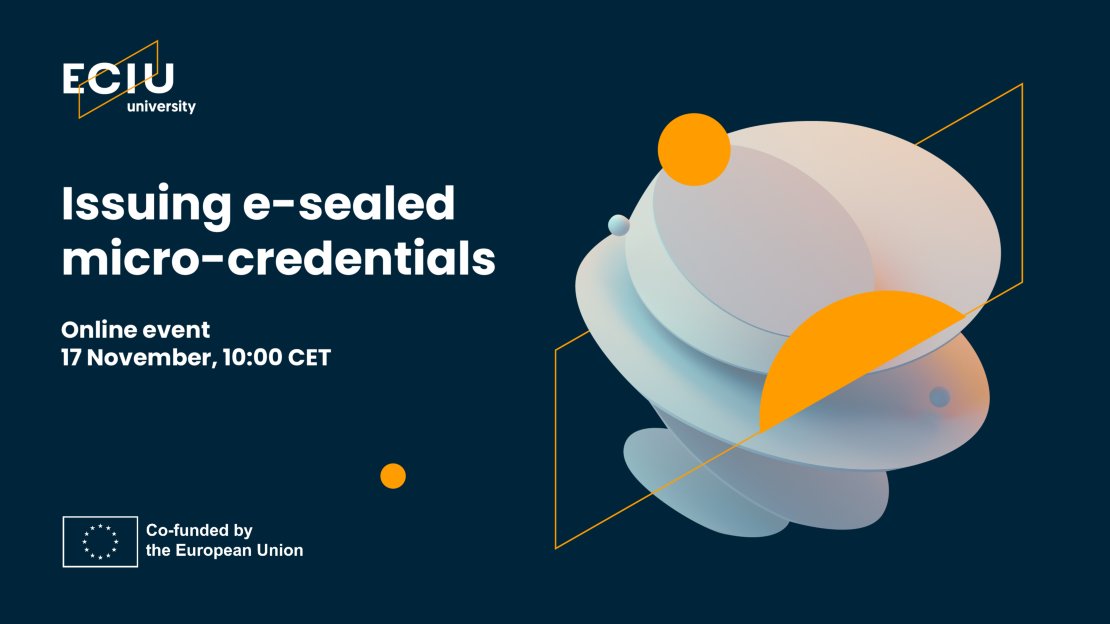
You can register for the webinar here.
- EU Commissioner opened the ECIU extended reality campus
On Monday, 20 September, EU Commissioner Mariya Gabriel opened the ECIU University Extended Reality (XR) Campus. The opening was streamed to YouTube. “It is a great example of what we can accomplish when we pool resources,” said Commissioner Gabriel. Via the Campus, learners have an environment to continue learning and have people interacting with each other, even at a distance.
The Extended Reality (XR) Campus was developed by Zoan, a creator of virtual worlds, in close collaboration with Tampere University, one of the ECIU partner institutions. After the Commissioner opened the Campus, Miikka Rosendahl (CEO of ZOAN) presented the future of XR technology. Professor Henri Pirkkalainen (Tampere University) presented how the XR Campus is used himself and learners to solve a real-life challenge of Tampere City. The event closed in a Challenge Room, where learners were working together to solve a challenge of Tampere City: “It is like we are working face to face”, said one of the learners about her experience of using the XR Campus as a tool in her learning. After the opening, the ECIU Community from all over Europe joined the XR Campus and met in virtual reality. No distance keeping was required.The XR Campus is ECIU University in virtual reality. The Virtual Campus is a huge milestone for the European educational community as it provides instant collaboration opportunities throughout Europe. Learners, teachers, researchers, and societal actors can access the Campus anywhere and anytime to immerse in interaction and co-creation fully. Challenges can be solved together, and the VR environment offers all kinds of opportunities for skills and competence development. People feel psychologically immersed as if they were physically present in the same space.
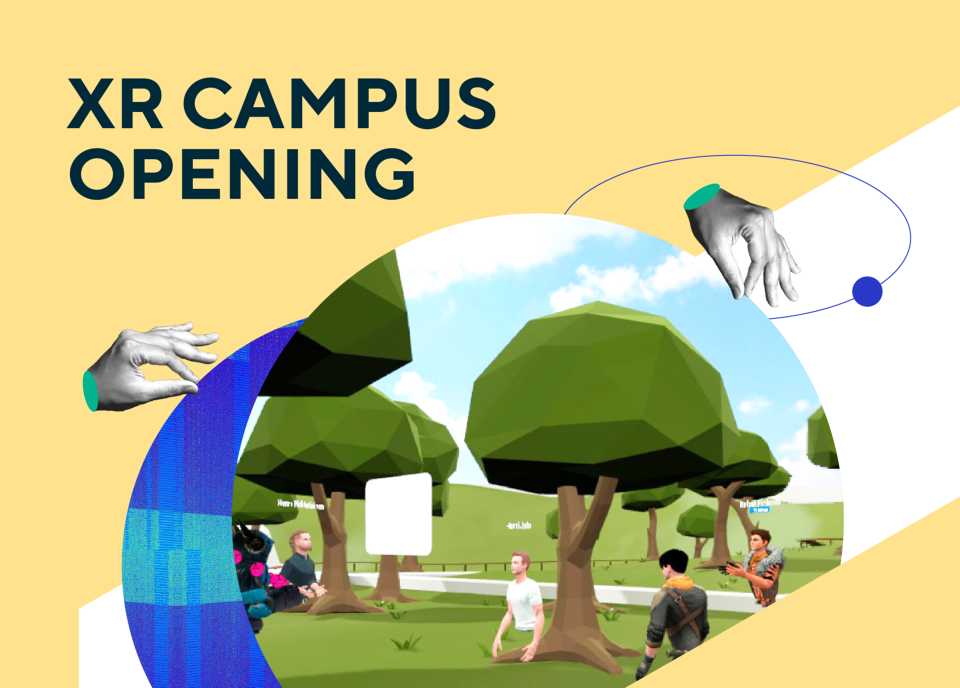 Building up a European university is all about experimenting and pioneering. With this pilot, ECIU University shows that the future of European collaboration in higher education is all about connecting our campuses and their communities. ECIU University is excited to find out how new VR technologies will enable us to work and learn together across borders.ECIU University will change the way of delivering higher education by its ground-breaking and innovative education model. ECIU University is an EU-funded initiative of the alliance of 12 universities. Learners, teachers, researchers, enterprises, NGOs, public stakeholders and citizens solve wicked multi-disciplinary challenges in the spirit of continuous learning. The aim is to transform traditional degree-based education into challenge-based. The for everyone accessible XR Campus will be a tool for working with stakeholders and challenge-based education, together with colleagues from all over Europe, naturally and innovatively.
Building up a European university is all about experimenting and pioneering. With this pilot, ECIU University shows that the future of European collaboration in higher education is all about connecting our campuses and their communities. ECIU University is excited to find out how new VR technologies will enable us to work and learn together across borders.ECIU University will change the way of delivering higher education by its ground-breaking and innovative education model. ECIU University is an EU-funded initiative of the alliance of 12 universities. Learners, teachers, researchers, enterprises, NGOs, public stakeholders and citizens solve wicked multi-disciplinary challenges in the spirit of continuous learning. The aim is to transform traditional degree-based education into challenge-based. The for everyone accessible XR Campus will be a tool for working with stakeholders and challenge-based education, together with colleagues from all over Europe, naturally and innovatively. - EU Commisionaris opens ECIU University XR Camous
EU Commissioner Mariya Gabriel will open the ECIU University XR Campus, and you can be part of it. The VR-event will be streamed on YouTube. Follow the opening of Europe’s first VR Campus on 20 September at 11:30 – 12:00 here.
The VR Campus is ECIU University – of which the UT is a partner university - in virtual reality an environment which can be accessed from anywhere and anytime to be fully immersed into interaction and co-creation together with others. It provides instant collaboration opportunities for the ECIU University community throughout Europe. There are challenges to be solved together, and individual, agile, flexible opportunities for skills and competence development. People feel psychologically immersed as if they were physically present in the same space.
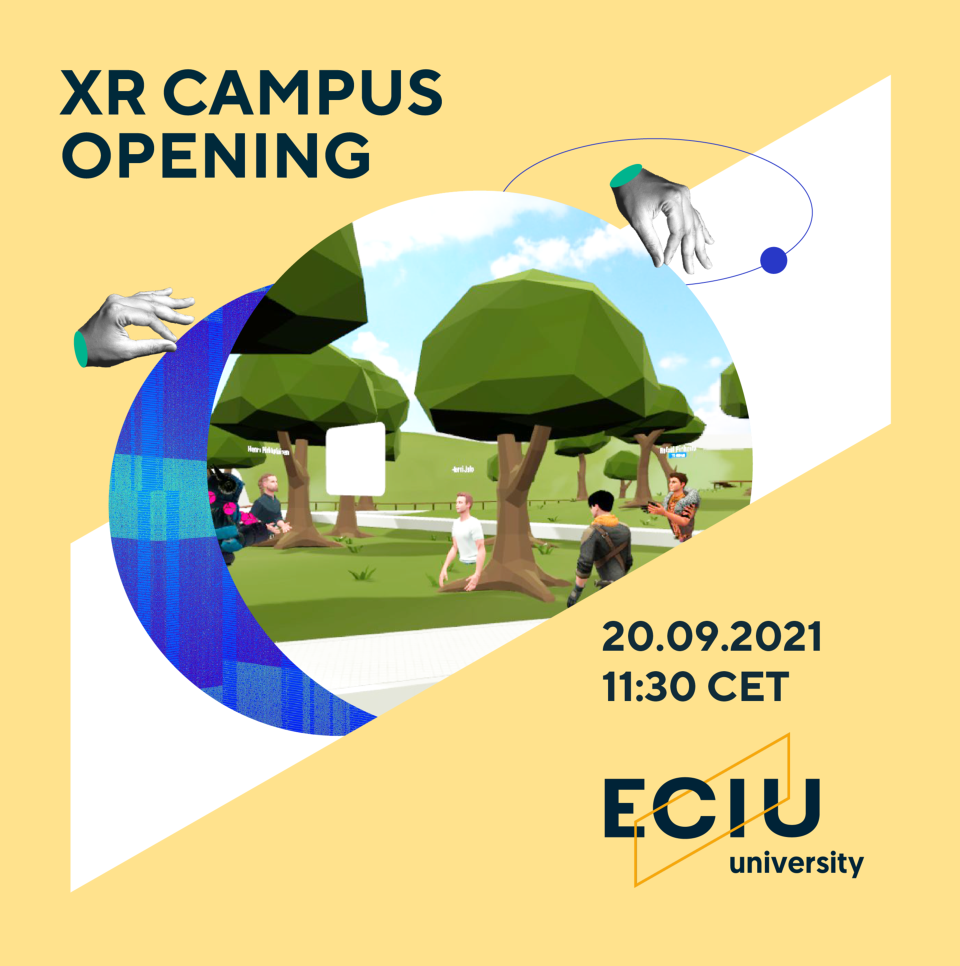
In the first stage, ECIU XR Campus is accessible with VR headset or using PC. In the future also access with mobile devices will be possible bringing the aspect of augmented reality into the picture.
Check here the opening programme.
- Postdoc grant at UAB for internationals
Universitat Autònoma de Barcelona has opened a call for application for the Maria Zambrano programme, a research programme from the Spanish Ministry of Education, funded by Next Generation funds and addressed to the requalification of the Spanish university system. Applications deadline: 30th September 2021.
Applicants for the María Zambrano modality must meet the following requirements:Requirements 1. To hold a doctoral degree.2. At the end of the application deadline, to have an accumulated postdoctoral career of no less than twenty-four (24) months in Spanish universities or research centres or in those located outside Spain, other than that in which their doctoral thesis was presented and examined.3. At the time of submitting the application, to be carrying out research projects and/or teaching at universities, research centres or organisations located outside Spain.4. Their requested stay must take place at the UAB on a continuous basis.5. The impact of their incorporation on the retraining of the UAB’s academic staff must be justified.6. Applicants must have the acceptance of a UAB department or institute, which will provide the necessary means for the development of their research activity.Grant characteristics:
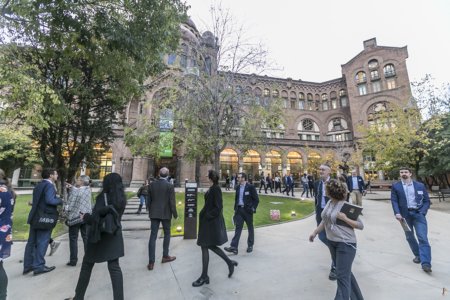 1. The mobility grants will take the form of 2-year postdoctoral contracts, with a gross monthly grant of €4,000, including the gross salary and the employer’s share of social security contributions. In addition, a one-off payment of €3,500 is established for relocation expenses.2. The grants cover full-time work. The deadline for implementation is 31/12/2023, and the deadline for completion of the stay is 31/12/2024For further details, please have a look at the call.
1. The mobility grants will take the form of 2-year postdoctoral contracts, with a gross monthly grant of €4,000, including the gross salary and the employer’s share of social security contributions. In addition, a one-off payment of €3,500 is established for relocation expenses.2. The grants cover full-time work. The deadline for implementation is 31/12/2023, and the deadline for completion of the stay is 31/12/2024For further details, please have a look at the call. - Invitation to join ECIU University challenges

Dear professional,
Do you want to engage in personal development and at the same time work with other professionals on relevant societal problems? Then, we invite you to join multidisciplinary and international teams to solve local, national and global challenges, provided by our business and societal partners across Europe.
We are ECIU, the European Consortium of Innovative Universities. Established in 1997, we are a leading international network of research intensive universities, with collective emphasis on innovation, creativity and societal impact.
The ECIU University is our initiative to build the European University where industry professionals, students, teachers and researchers cooperate with cities and businesses to solve real-life challenges. Together, we create, test and evaluate a new educational methodology of challenge-based learning, which focuses all our activities, from education to innovation.
In the ECIU University, we create a playground for solving multi-disciplinary challenges in entrepreneurial, innovative ways and provide personalized learning and career opportunities for life. Our vision is a novel university model based upon co-creation at the European level.
WHY PARTICIPATE?
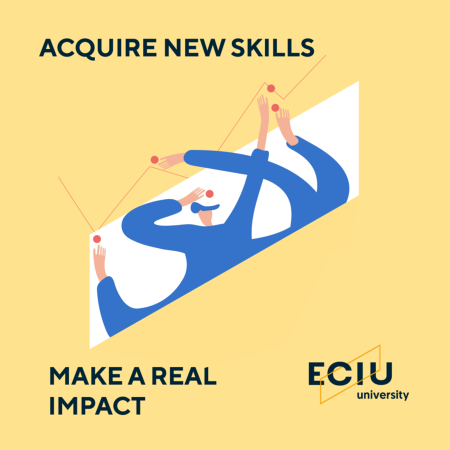 • You will work on multidisciplinary challenges where you will practice analytical and critical thinking, reasoning and entrepreneurship. You will improve problem-solving skills, which are the cornerstone of the challenge-based education in ECIU University.
• You will work on multidisciplinary challenges where you will practice analytical and critical thinking, reasoning and entrepreneurship. You will improve problem-solving skills, which are the cornerstone of the challenge-based education in ECIU University.• You will be part of a diverse team that involves students and lifelong learners from different fields. You will experience work in a team with different cultures and an international environment.
• Your learning journey will be accompanied by team facilitators, or so-called “teamchers”, and the representatives of business and public stakeholders – the challenge providers.
• You will gain insight and perspectives from experts, students and lifelong learners from different European universities, as you will work with Europeans coming from the diverse backgrounds and expertise.
• You will join a network of people who share the same enthusiasm at an international level.
• By participating in challenges, you will work on the solution of socially significant issues and have the possibility to put your own mark on the development of society.
• You will gain experience of open community culture and agile ways of working that will give you the tools to create an innovative culture.
OUR CHALLENGES
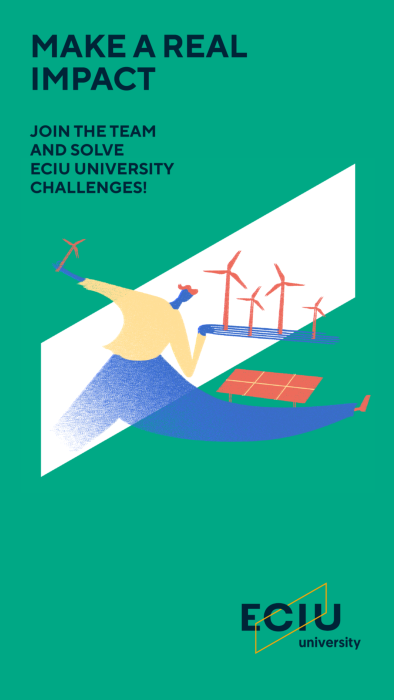 For the ECIU University Autumn semester, you can register for:
For the ECIU University Autumn semester, you can register for:1. PREVENTION OF TEXTILE WASTE
Textiles, that until recently were not considered waste, in recent years and as the market has been flooded by an increasing supply and reduced prices, it has become a waste that requires special attention in the framework of a circular economy. Together with the Vallès Municipality and the Universitat Autònoma de Barcelona, you will be facing the challenge of the selective collection of textiles from 1st October until 29th October.
Learn here more about this challenge.
2. FROM FARM TO FORK
The grand topic of the challenge is distribution and delivery of local agricultural production to help small farmers and allow a healthy lifestyle for the population. If you are curious to solve challenges such as how to improve the distribution of local agricultural products in Trento, based on consumers‘ needs, or how to improve the lifestyle of the final consumers, you can join this challenge and develop a concrete action plan in partnership with Trento Municipality and the University of Trento. This challenge will be held from 15th November until 16th December.
Learn here more about this challenge:
YOUR PROFILE
If you are a professional resident in one of the ECIU member’s countries with a Bachelor Degree and you have a curious personality, you are the perfect fit for our ECIU challenges. All lifelong learners that are eager to create value in an area of interest and want to have an innovative experience can join our challenges. A good command of English is necessary as all challenges are held in English due to the international environment.
HOW DOES IT WORK?
Our challenges are provided by a city, region, business or public stakeholder and are presented on the ECIU University Challenge platform. Challenges can vary in length, from a one or two-day challenge, for example, a hackathon, a challenge that lasts four to eight weeks. Any participation is free of charge.
1. You can register to the Challenge platform and then apply to those challenges open to lifelong learners.
2. After the approval of your application, international or/and multidisciplinary teams are formed and include other lifelong learners, student learners and a team facilitator.
3. The team works with the challenge provider (and other participants), engages and investigates the challenge, and proposes solutions using the challenge-based learning methodology.
4. Finally, teams deliver their proposed solutions further – which may include services, products, research questions, start-ups and spin-offs.
5. After successful completion of the challenge, the learner receives a Certificate of Participation.
CONTACT DATA
Any questions? Please write to us: challenges@eciu.org
Explore frequently asked questions here.
Apply to the challenges here.

- Webinar
Join this webinar, organized in a collaboration between the BMS teaching academy and the philosophy department of the Universtity of Twente, if you are interested in the development of challenged-based learning (CBL ) and especially want to know how to implement it in sich a manner that students' academic skills development will be stimulated. On Friday July 2, we focus on the question of why reflection is essential for the development of academic skills in CBL.
We aim for a shared vision on the role of reflection in CBL, and learn what can be an effective approach for reflection education. So that students will benefit optimal from using the CBL approach. You are invited to share your ideas, thoughts, and experiences with us.Questions we like to discuss with you are:1. Why is reflection important?2. Good practices and ‘bad’ practices.3. What support and tools are needed for efficiently training students in reflection skills integrated into CBL?4. How to ensure that reflection is effective?Text continues below the photo
 PROGRAMMEHost: Prof. dr. ir. Mieke Boon (Dean ATLAS-UCT)Assistant host: Adina Imanbayeva (CBL Student Assistant ECIU/CELT)Panel: Prof. Barend van der Meulen (BMS, CHEPS), Dr. Janneke Ettema (Teaching & Learning Fellow ITC), Dr. Anna Bos-Nehles (Teaching & Learning fellow BMS), Rianne Kaptijn (Local ambassador ECIU), drs. Helma Vlas (Member CBL steering committee BMS), Luuk Buunk MCs, (CBL expert CELT/ECIU), Dianneris Diaz Quinde (student B-ID), Carolina Pereira Marghidan (Student M-SE)For more information and online registration, please follow this link: online registration webinar: The role of reflection in CBL
PROGRAMMEHost: Prof. dr. ir. Mieke Boon (Dean ATLAS-UCT)Assistant host: Adina Imanbayeva (CBL Student Assistant ECIU/CELT)Panel: Prof. Barend van der Meulen (BMS, CHEPS), Dr. Janneke Ettema (Teaching & Learning Fellow ITC), Dr. Anna Bos-Nehles (Teaching & Learning fellow BMS), Rianne Kaptijn (Local ambassador ECIU), drs. Helma Vlas (Member CBL steering committee BMS), Luuk Buunk MCs, (CBL expert CELT/ECIU), Dianneris Diaz Quinde (student B-ID), Carolina Pereira Marghidan (Student M-SE)For more information and online registration, please follow this link: online registration webinar: The role of reflection in CBL10:30 - 10:40
How does learning occur in Challenged Based Learning by Leonie Chapel (CBL expert CELT/ECIU)
10:40 - 10:50
Reflection by Yashar Saghai (Assistant Professor at BMS)
10:50 - 11:05
Reflection in Education by Peter Paul Verbeek (Professor of Philosopher of technology at BMS)
11:05 - 11:20
Training of reflection within CBL and scaffolding by Mieke Boon (Professor Philosophy of Science in Practice at BMS)
11:20 - 11:35
Q&A
11:35 - 12:00
Panel discussion
- New ECIU Presidium
Yesterday at the online Executive Board meeting, the ECIU Board confirmed the new ECIU Presidium led by the ECIU President Màrius Martínez (UAB) for the term of three years. The Presidium consists of Màrius Martínez (ECIU President), Mari Walls (ECIU Vice-President), Jan-Ingvar Jönsson (Treasurer) and Tom Veldkamp (Coordinator Erasmus+ ECIU University).
'It is a great honor to join the ECIU Presidium and to have this opportunity to contribute to the strategic choices needed to turn the ambitious ECIU vision into reality', Mari Walls syas. 'Questions like the resilience of societies and enabling research-based higher education for life are shared by all European universities. I believe that we have a lot to gain through working together and untapping our unique synergies.'
The new Presidium will work closely together on the transition of the network of universities towards a joint future as a functioning European University, interacting in an open European ecosystem of industry and SME’s, learners NGO’s, regions and municipalities. The ECIU Presidium has a crucial role in conveying the ECIU University Vision 2030 internally in the ECIU and externally to stakeholders and accelerate it.
'I’m very excited about this new Presidium since it will have to manage a huge challenge which is leading ECIU to build and make ECIU University a reality, a new reference on Higher Education in Europe and globally', Màrius Martínez syas. 'The new Presidium is reinforced, now with four members and I am very honored to have onboard three great rectors of our universities. Together we will work to build an innovative European University based in our DNA: challenging conventional thinking and making a true and real impact in Europe and beyond.'
- The new ECIU University magazine
The ECIU University is a massive joint effort of the ECIU member universities and their regional partners. More than a few hundreds of staff members at the member universities and in the regions are collaborating to making the ECIU University a reality. This new issue of the magazine showcases several activities of ECIU University and the opportunities to engage with the European University.
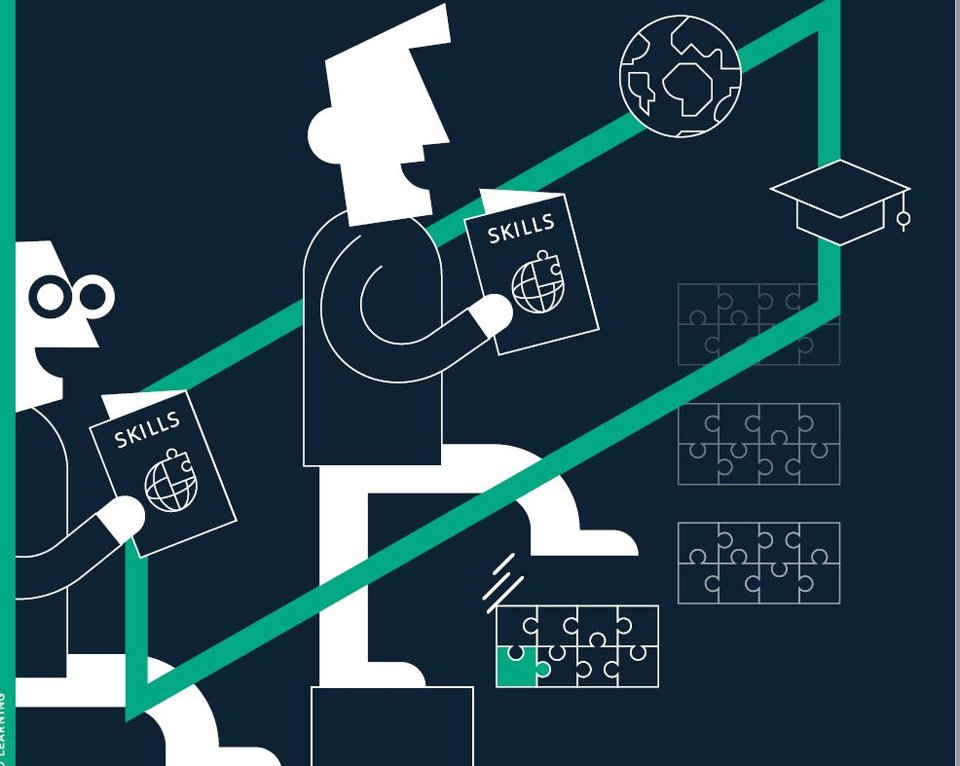 Enjoy reading, be part of and stay connected to the ECIU University!Please read the whole magazine here.
Enjoy reading, be part of and stay connected to the ECIU University!Please read the whole magazine here.
- Older
- Next phase of ECIU university granted
The European Consortium of Innovative Universities (ECIU) was granted the European Union Erasmus programme support to continue building ECIU University, last week. The next phase will start in November 2022. The university will receive a budget of up to €14.4 million from the Erasmus+ programme for four years. Alongside member universities, ECIU, as a foundation, is included as a beneficiary for the grant. ECIU University is one of the first European Universities to receive the grant as an organisation.
The next steps of the joint European University will strengthen the development of three key innovative concepts in higher education: flexible learning pathways, micro-credentials, and the challenge-based approach.
The ECIU flexible learning pathways are the core concept within the ECIU University ecosystem. ECIU University replaces the traditional ‘degree’ with a European competence passport. ECIU University will continue to work on pathways based entirely on the learners' choices and needs. The modules and challenges will be offered to the learner according to an individual motivation scan. Successful completion will result in a digital competence passport that will store micro-credentials and update learning outcomes continuously.
Micro-credentials are now gaining momentum. They are seen as a promising tool to boost lifelong learning and employability within Europe. ECIU has taken the lead in piloting micro-credentials for a couple of years now, allowing the best practices and lessons learned to be transferred to the second phase of ECIU University. In upcoming years, the majority of ECIU member universities will start issuing micro-credentials assuring the necessary advance in the micro-credential movement.
Challenge-based learning approach has been proven to be a successful educational tool to engage learners, teachers, staff members and stakeholders in solving real-life challenges. At ECIU University, more than 400 students and more than a 100 teachers and staff members have been involved in past years, solving more than 60 challenges proposed by industry, cities and communities. In addition to this, micro-modules were offered to learners to deepen their knowledge. Within the next years, challenges and micro-modules will continue to be the key components of flexible learning opportunities, offered to the communities inside ECIU and continuous learners outside the alliance.
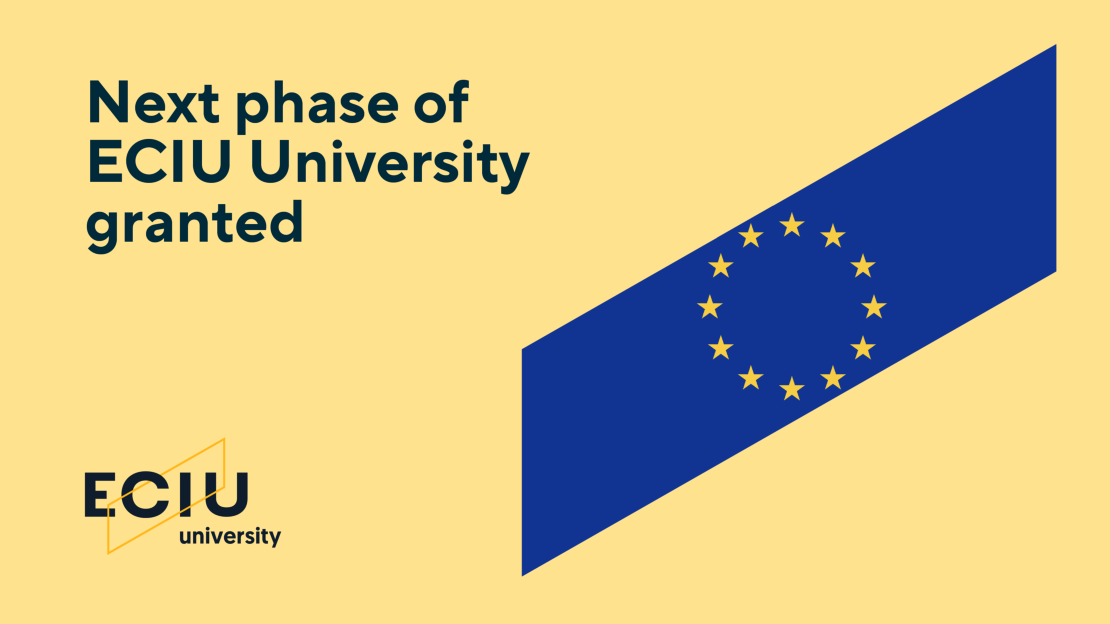
NEW THEMES AND VOLUMES
In the first pilot years, ECIU University challenges focused on Sustainable development goal no. 11 “Sustainable cities and communities”. In the next phase, ECIU University challenges will cover a wider area of globally relevant topics, like climate change.
Sander Lotze, Project Director of ECIU University, considers several ecosystem elements to be crucial for the successful implementation of the next phase. “First and foremost, ECIU University has to serve people. We need to continue building the communities of practice within ECIU University, with more learners, academic staff and stakeholders engaged. Related to that, a sustainable IT infrastructure is needed. With the budget granted by the EU, ECIU will be empowered to better support the realization of these joint ambitions”.
The director is convinced that in the next few years the ECIU University community needs to grow significantly. “The second phase of ECIU University will bridge current pilot developments to the establishment of a start-up. This will result in the deepening of the cooperation and strengthening of community relations across multiple levels. By 2026, ECIU University will be an ecosystem of thousands of learners, hundreds of staff members and external stakeholders, creating a sustainable societal impact in Europe. I am looking forward to it”, says Lotze.
The ECIU University will continue to be built by 13 ECIU member universities.
- UT wins Dutch higher education award
The Master's insert 'Shaping Responsible Futures' of the University of Twente has been awarded with the Dutch higher education award. This was announced during the Comenius Festival in Nieuwegein, last week. The team received the prestigious award for educational innovation from Minister Robbert Dijkgraaf. The prize is accompanied by a sum of EUR 1.2 million.
The study programme is an additional programme for master’s students, but also for exchange students. Challenge Based Learning and self-directed learning are two important themes.
The Master's Insert is initiated by DesignLab and the Faculty of Engineering Technology of the University of Twente.
Read the whole article here.
- Micro-module in 'intercultural competences' kick-offs
The opening session of the micro-module “Intercultural Competences: Guiding practical insights through Citizen Science (ICCS) took place online recently.
The course is organised by seven ECIU-member universities: the UAB, the INSA Groupe (France), the Kaunas University of Technology (Lithuania), the University of Trento (Italy), the University of Stavanger (Norway), Aalborg University (Denmark), and our university.
A total of 136 people have signed up for this 9-week micro-module worth 2 ECTS credits.
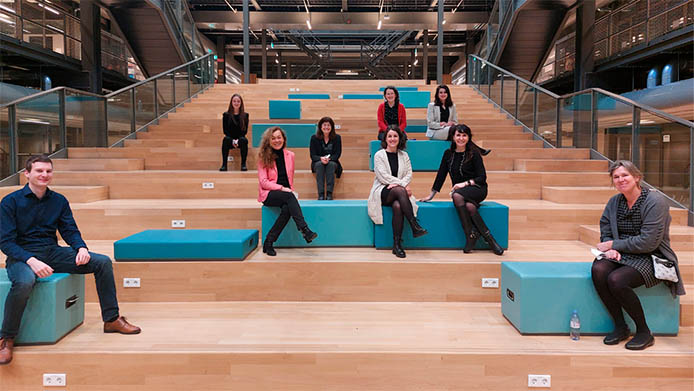
The objective of this micro-module is to help students determine and improve their level of intercultural skills through conferences and teambuilding with the best experts in Europe, and which will then be applied to an international citizen science project.
Micro-modules open for application
Micro-modules are courses providing support to students and helping them broaden their knowledge of a specific area.
Currently, the different universities forming part of the ECIU University offer 43 micro-modules that are open for application. Subjects vary greatly from accessibility to sustainability, and from languages to artificial intelligence.
For more information please visit: Micro-modules Platform
- EU Commissioner Gabriel: 'ECIU University is leading the way'
Rectors and Presidents of ECIU met with Mariya Gabriel, EU Commissioner for Innovation, Research, Culture, Education and Youth, last week in Brussels. The ambitions of ECIU University for the European Degree, ECIU’s take on future fit universities, and ECIU’s legal and financial needs were discussed.
Gabriel concluded that ECIU University is leading the way, inspiring the broader European higher education community, and she looks forward to continue working together with ECIU when shaping future EU policies.
The Commissioner also welcomed the call for a programmatic approach to funding. She also underlined her ambitions to work towards a digital platform for universities early next year, in line with the current work of ECIU University to build a digital platform for closer cooperation.
During the meeting, the President of the European Consortium of Innovative Universities (ECIU) Màrius Martínez, Vice-President Mari Walls, Treasurer Jan-Ingvar Jönssen and the coordinator of ECIU University Vinod Subramaniam presented ECIU’s ambitions for the coming years.
Martìnez welcomed the European Strategy for Universities and the Council Recommendations on micro-credentials and building bridges for effective European higher education cooperation. Martínez also presented ECIU’s newest member: Lodz University of Technology. Furthermore, Martínez spoke about ECIU University’s ambitions to work towards a more central organisation, building on the deliverables of the past two pilot years.
Walls presented ECIU University’s take on the European Degree: A competence passport, built upon individual and flexible learning pathways based on learners’ choices and needs. The Commissioner welcomed this interpretation, and supported the ECIU slogan ‘Connects U for Life’, referring to ECIU’s lifelong learning ambitions.
Jönssen welcomed the Commissioner’s work towards a European legal statute for alliances and higher education institutions. To deliver European education, solve societal challenges in close cooperation with society, and to create a European network for knowledge, we need such a statute. Jönssen handed over the ECIU position on the Legal Statute to Commissioner Gabriel.
Subramaniam welcomed the new Erasmus+ 14,4 million euro call to further roll-out the ECIU University, which is very much aligned with our ambitions. Subramaniam underlined the need for a holistic approach to funding, supporting all universities missions in a sustainable and coherent manner.
The meeting ended with an open dialogue between Commissioner Gabriel and all ECIU’s Presidents and Rectors.
- Call for challenge-based learning is heard
The recent call to submit a proposal for the implementation of challenge-based learning in university education did not go unnoticed. A total of 32 proposals were submitted, of which 26 have now been honoured. The total available budget of 368 thousand euros has been spent. Responsible for organizing were UT and ECIU University.
The purpose of the call is to encourage educational innovation. ‘And this time the focus is on challenge-based learning’, says Rianne Kaptijn, Local Ambassador of ECIU, the European Consortium of European Universities. ‘Together with the UT, we want to encourage challenge-based learning (CBL) in education. During this learning method, students work on real, existing assignments and do so in teams in which professionals and researchers also participate.’
Kaptijn is ‘very happy’ with the number of initiatives, which are also very diverse. For example, there is a minor called ‘cold case’. In which, as the name suggests, students from UT and Saxion work together with the police academy on an unsolved crime. ‘And there are challenges from the EEMCS faculty about energy transition and CBL in Computer Science. Also very exciting. The TNW faculty, among others, came up with natural and engineering research in challenge-based learning, yet also with a question about the role of the teacher in CBL’, says Kaptijn.
Proposals could be submitted at various levels: course (19), faculty (1) and cross-faculty level (5). The content varied on three themes: improving the quality of CBL as a teaching method (15), strengthening external relations (9) and strategic, organisation-oriented proposals (2).
Challenge-based learning is high on the University of Twente's agenda and fits in with its ambitions concerning educational innovation. The ECIU University, a partner of the UT, offers room to experiment with CBL and other innovative teaching methods.
Would you like to know more? Send an e-mail to: cbl-ces@twente.nl
Or read teacher Sikke Jansma’s story here and be inspired.
- Connection higher education teachers
To prepare students for future challenges in digital and international working environments teachers across Europe strive to introduce innovative pedagogical methods and digital teaching tools. In tackling the didactic challenges of innovating practices and tools, teachers in higher education (HE) often turn to their immediate professional environment, usually within their own institute. But this network does not always offer a solution. Until now, finding like-minded colleagues in other institutions or even across boarders dealing with similar issues and who might even have found solutions has required time and effort. But this is about to change.
The ColLab Platform seeks to support HE-teachers and developers in overcoming those obstacles and so benefit from the practices and experiences of colleagues from across Europe. To launch the ColLab Platform, on 10th February 2022 from 10am to 5pm (CET) an online-conference offers a condensed day of interexchange and fresh ideas about HE-teaching on a European scale. With the triad of inspiration, collaboration and sharing experience, the conference aims to be the starting point for the development of innovative teaching practices and, thanks to the platform, establishing a vibrant, collaborative international HE-teaching community.
 Inspirational talks on the future of teaching and learning are followed by presentations by teaching-award winners from different countries sharing their innovative teaching and learning experiences. Networking is at the heart of the conference and all participants will get ample opportunity to connect with others.
Inspirational talks on the future of teaching and learning are followed by presentations by teaching-award winners from different countries sharing their innovative teaching and learning experiences. Networking is at the heart of the conference and all participants will get ample opportunity to connect with others. The ColLab Platform fosters discussion, the sharing of practices and the formation of groups of teachers (Communities of Practice) based on innovative learning methods such as Challenge Based Learning (CBL), Collaborative Online International Learning (COIL) or indeed any other new or challenging pedagogical practice. All participants at the conference will be invited to set up their profile, join a Community and even initiate their own Communities of Practice on the newly launched COLLab-platform.
The COLLab-conference is free of charge and will take place online. It is now open for registration and all HE-teachers and HE-developers are welcome to join. Further information can be found on the COLLab-Website.
______________________________
COLLab is an ERASMUS+ Strategic Partnership coordinated by the Universidade de Aveiro (Portugal). Further members of COLLab are: Università degli studi di Trento (Italy), Technische Universität Hamburg (Germany), Kauno Technologijos Universitetas (Lithuania) and Universitetet i Stavanger (Norway). These Universities are part of a wider alliance called European Consortium of Innovative Universities (ECIU), a leading European university network that challenges conventional ways of teaching, researching and innovating through the EU European Universities initiatives. Learn more at https://www.eciu.org/eciu-university
- 'We are reinventing ourserlves thanks to ECIU'
The landscape of higher education is changing. This requires a different kind of university, with more focus on skills, providing personal, flexible learning paths. The ECIU University meets that need. Victor van der Chijs will stop as president of the European Consortium of Innovative Universities (ECIU). A retrospective - and an outlook.
Text: Sandra Pool
Almost four years of being president, now nearly over. How do you look back on that period?'With pride and with great pleasure. I've noticed that the thirteen partner universities are growing closer. That was everyone’s wish from the get-go. The call from the European Union, which led to the creation of ECIU University, accelerated the pace of cooperation. Initially, it was mainly about exchange, education and the leadership program for future leaders. Now, we are taking bold steps together to develop the education of the future. And we can, because the consortium has existed for almost 25 years now. We know each other well and there is a lot of mutual trust. Each partner university has reinvented itself in part thanks to ECIU.'
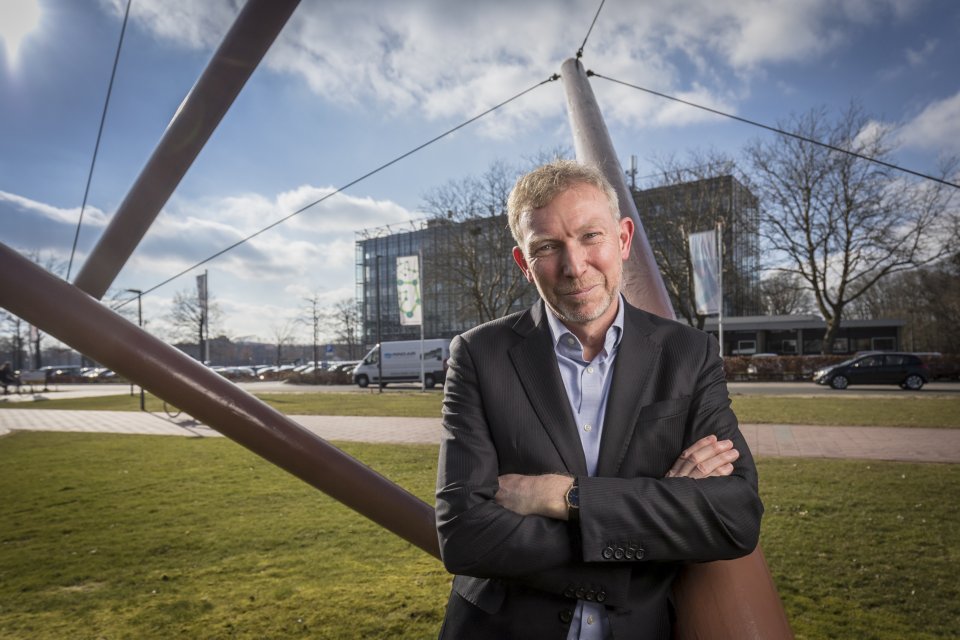 What are the next steps?'
What are the next steps?'Of the 41 European university alliances participating in the European Commission's call to consider the university of the future, ECIU is the largest group with the longest history. Our programme is ambitious; that makes us one of the frontrunners in Europe at the moment. For example, we recently wrote a whitepaper to gain a better understanding of issues relating to micro-credentials. The contact with Brussels is also good. This is partly due to having our office in the Belgian capital. We regularly speak with European Commissioner Mariya Gabriel, whose portfolio includes education. She said to us recently: “You are the future of higher education in Europe and are showing how things should be done." A wonderful affirmation. Now it's up to us to deliver.'
And how does that work in practice?
We are making full use of the potential of the consortium. We take full advantage of each other's knowledge and skills. On the topic of micro-credentials, for example, Dublin City University is in the lead because of their experience in this area. And when it comes to digital learning, Tampere University plays that role. There is a lot of enthusiasm and commitment and our learning curve is very steep. If something ever doesn't work out, we are honest with one another and look at how we can help each other to achieve our goals. There have been plenty of such examples in recent years. It is a huge puzzle, and if you want to do it right, you need to look ten years ahead. That's what we agreed upon together. This won't stop after the pilot. For example, we are already working on getting an ECIU digital platform aligned.'
What does ECIU University mean for UT?
'The ECIU University is a vehicle for innovation, in terms of both research and education. This must be embedded within the faculties. We had a great discussion with the University Council on how we, UT, can derive maximum benefit from the consortium. The faculties are very eager but also still putting the puzzle together. This is pioneering. Within the academic world, there are always people who want to experiment and say 'come on, let's get on with it'. We are part of a pilot, and that things are going wrong is part of the process. We have allowed room for that.'
What ingredients should definitely be included in the recipe for future-proof education?I think about my sixteen-year-old son, who will soon be going to university, and what I would love for him to have access to by then. Definitely the option of adjusting his learning path along the way. I studied law myself, simply because I didn't know what I wanted. If only I could have changed halfway! Eventually, my interests turned more towards political science. Room to experiment and switch must be built into the system, along with options for gaining international experience, learning to work together and finding out how society works. My son will soon learn that a problem can have several solutions and that these ought to be tackled together, in multidisciplinary teams. That is exactly what we are doing with ECIU University.'
And if you look at the university itself, how will it evolve?
'On top of, or parallel to, or within the current educational institutions, a flexible structure is starting to arise. This allows students to learn in a different way, to get acquainted with new disciplines and to contribute to solving social problems. It is up to the student whether he or she does eighty percent of his or her studies within the 'established order' and twenty percent within the 'super structure', or fifty-fifty or even one hundred percent superstructure.’
What do you wish for the ECIU University?
'To continue innovating. The partner universities have found each other on all fronts. That step has been taken. Now the ECIU University needs to land the plane within the institutions. This movement has been set in motion and is our answer to the call to develop the education of the future. Society needs broadly developed talents with more focus on skills. It is a great thing to be able to anticipating for this already.' This article was publised in ECIU University Magazine. Please read the whole magazine here.
- Màrius Martínez new president ECIU
Màrius Martínez, Vice Rector for International Relations at the Universitat Autònoma de Barcelona (UAB) will take over from Victor van der Chijs (University of Twente), who has been president of the ECIU since 2017.
Martínez now will be in charge of directing the Board and the ECIU network, as well as leading the ECIU with its ambitious ECIU University into its next level of development, taking it beyond its initial phase conducted under Erasmus+ funding.
After being appointed president on 19 March 2021, Màrius Martínez affirmed that it will be ‘a true privilege and honour’ through the consortium's presidency to contribute to making a reality this process that is already so much more than a joint project. ‘Our main active is a powerful and competent team who is doing excellent work in bringing to life a vision that is shared and upheld by all our members.’

As president, Martínez will play a crucial role in transmitting the ECIU University's 2030 vision, both internally among the consortium members, and externally to all stakeholders, and he will be working on accelerating actions. He also will seek to strengthen relations with the European Commission and other entities to make sure long-term funding is available for the ECIU University.
About Màrius Martínez
Màrius Martínez is currently Vice Rector for International Relations at the UAB and Senior Lecturer in Professional Guidance at the UAB Department of Applied Pedagogy. He has lectured in Pedagogy, Psychopedagogy and Social Education, in the master's degree in Teaching in Secondary Schools and in the master's degree in Psychopedagogy.
His lines of research and knowledge transfer are related to professional guidance, educational networks and learning communities. He has done academic and knowledge transfer stays in Belgium, United Kingdom, the Netherlands, Denmark, Italy, Portugal, Chile and Nicaragua.
- ‘ECIU University is an inspiring alliance'
The ECIU Presidium discussed the ambitions of ECIU University for 2030 with Mariya Gabriel, EU Commissioner for Innovation, Research, Culture, Education and Youth, on 12 March. Gabriel concluded that ECIU University is a promising alliance and that ‘we all have the ECIU University 2030 Vision in mind’.
In the meeting, the President of European Consortium of Innovative Universities (ECIU) Victor van der Chijs, Vice-President Per Michael Johansen, Treasurer Màrius Martínez and ECIU University Director Sander Lotze shared the ECIU University Vision 2030 and elaborated on the ECIU University’s take on the European Degree and Agora model.Van Der Chijs underlined the urgent need for funding: ‘EU-funding helps us pressure our national regulations and frameworks to innovate Europe’s higher education’’. He asked the Commissioner how to move towards a sustainable funding model. The Commissioner referred to the EU Recovery Fund that the EU Member States are currently implementing. Gabriel also underlined the extraordinary support for the European Universities Initiative by her colleagues Schmit, Timmermans, and others.
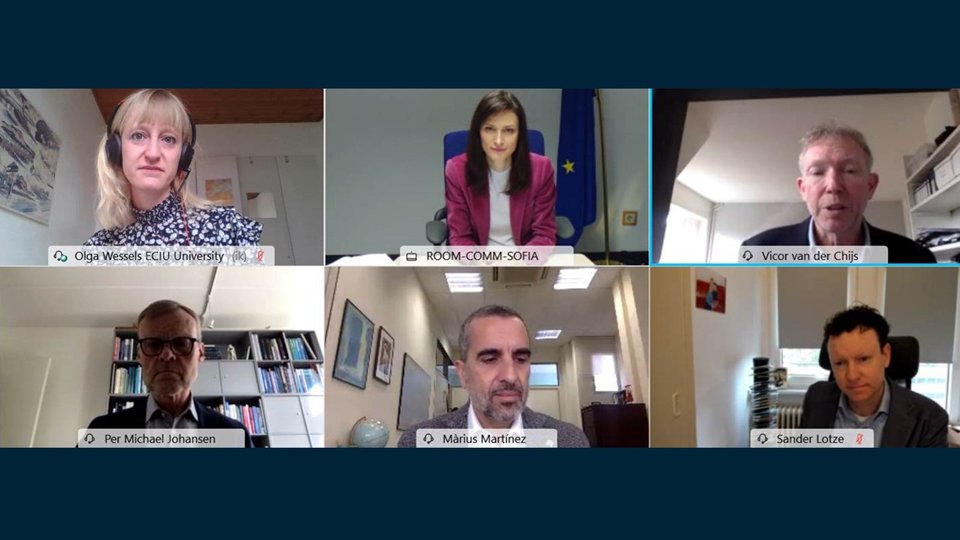 ‘The European Degree is an opportunity to create something new, innovative, flexible and personalised’, stated Johansen. This vision and the ECIU University work on research-based micro-credentials was welcomed by the Commissioner, stating that this can serve as a reference to other universities in Europe. She invited ECIU University to continue to share their input for the future development of micro-credentials in Europe.The Commissioner applauded ECIU’s work on life long learning, challenge-based learning and its Agora model. Màrius Martínez about the Agora model: ‘A European ecosystem where education, research and innovation questions and knowledge of the member universities and their stakeholders come together.’The Commissioner promised to avoid a funding gap when the second phase of the European Universities’ Initiative starts in 2022. She concluded by inviting ECIU University to share input on the Higher Education Transformation Agenda, to continuously seeking synergies with other European programme and policies, and to share ideas and raise issues to strengthen the next phase of the European Universities’ Initiative.
‘The European Degree is an opportunity to create something new, innovative, flexible and personalised’, stated Johansen. This vision and the ECIU University work on research-based micro-credentials was welcomed by the Commissioner, stating that this can serve as a reference to other universities in Europe. She invited ECIU University to continue to share their input for the future development of micro-credentials in Europe.The Commissioner applauded ECIU’s work on life long learning, challenge-based learning and its Agora model. Màrius Martínez about the Agora model: ‘A European ecosystem where education, research and innovation questions and knowledge of the member universities and their stakeholders come together.’The Commissioner promised to avoid a funding gap when the second phase of the European Universities’ Initiative starts in 2022. She concluded by inviting ECIU University to share input on the Higher Education Transformation Agenda, to continuously seeking synergies with other European programme and policies, and to share ideas and raise issues to strengthen the next phase of the European Universities’ Initiative. - Take the European Universities Initiative to the next level
A streamlined and open programme can build on existing energy, say Dorothy Kelly and colleagues. In recent years, the European Universities Initiative (EUI) has become a prominent feature on the landscape of higher education. Since its pilot phase was launched in 2019, the initiative has created 41 different cross-border university alliances involving more than 250 universities. There has been a proliferation of different models, programmes and formats, but one constant theme has emerged —enthusiasm for these alliances.
The initiative has unleashed a wave of positive energy, which could transform European higher education. How can we maintain this energy, point it in the right direction, and maximise its impact? Or, to put it another way, how can the initiative reach its full potential when it is rolled out more widely? One obvious point is that the initiative will only succeed with adequate support, both financially and in terms of more flexible national legislation and frameworks for international collaboration in European higher education.Beyond this, though, to effectively channel the positive energy generated, the initiative must be as holistic and open as possible in terms of its activities, participants and governance.Simplify supportUniversities naturally integrate education, research and innovation. With traditional boundaries between teaching, learning and research becoming increasingly blurred, future funding instruments—whether at European or at national level—need the flexibility to accommodate and support new ways of working. Strengthening research and innovation, for example, will make the institutions in EUI alliances better and more able to fulfil their primary educational mission. In turn, the schemes would increasingly act as catalysts in their local research and innovation ecosystems, in the process helping to address regional disparities across Europe. In this regard, the dedicated budget allocated to EUI pilots in the Horizon 2020 programme was a step in the right direction. This topped up funding from the Erasmus+ exchange programme and kickstarted the initiative’s research and innovation dimension. It also, however, meant the initiative had to deal with different instruments, timelines and reporting structures for the two funding streams. This risks hampering efficiency and, ultimately, eroding impact. The start of the new EU financial framework, which runs from 2021-27, provides a unique opportunity to streamline support for the EUI, moving beyond simply encouraging synergies between European universities to funding true integration between education, research and innovation. In the short term, the Erasmus+ and Horizon Europe programmes need to be more closely coordinated in support of the EUI. As participants, we would welcome a single call that encompasses all strands of our mission. In the longer term, there should be a move towards a more sustainable block grant that would fund delivery of all our EUI activities. Look outwardsIf Europe is to take a leading role in education, research and innovation, the EUI should be as open as possible to ideas and approaches. We would like to see the initiative open up to institutions beyond those countries participating in Erasmus+. Education, like so many other challenges facing society, is a global issue, shaped by factors such as worldwide demographic patterns. To fully harness the potential of the EUI, dialogue on education, research and innovation is needed at regional, national, European and international levels. This calls for mechanisms that channel and integrate discussion, and allow those who govern, fund and participate in the initiative to work together to shape its future. We are ready to join this discussion, together with the European Commission, EU member states and the broader higher education community. Speaking from experience, the EUI is arguably the most exciting thing happening in European higher education right now. We are committed to keeping the energy high and enthusiasm contagious.Dorothy Kelly is coordinator of the Arqus European University Alliance; Joan Guárdia Olmos is coordinator of CHARM-EU; Victor van der Chijs is president of the ECIU; Jean-Marc Ogier is chair of the governing board of EU-CONEXUS; Eva Wiberg is chair of the board of EUTOPIA; Verena Blechinger-Talcott is chair of the board of directors of Una Europa; Tanja Brühl is president of UNITE!; Martin Paul is chair of the strategy board of the YUFE Alliance.This opinion piece was published at Research Europe, March 10.
- SMART-ER is on
Thursday, February 4, with the kick-off meeting, ECIU University has opened SMART-ER, a research institute for smart European regions. The virtual research institute will bring researchers, businesses, citizens and society together to develop the ECIU University research and innovation activities. SMART-ER will focus on: open science, sustainability, co-creation with society, and upskilling research talents.
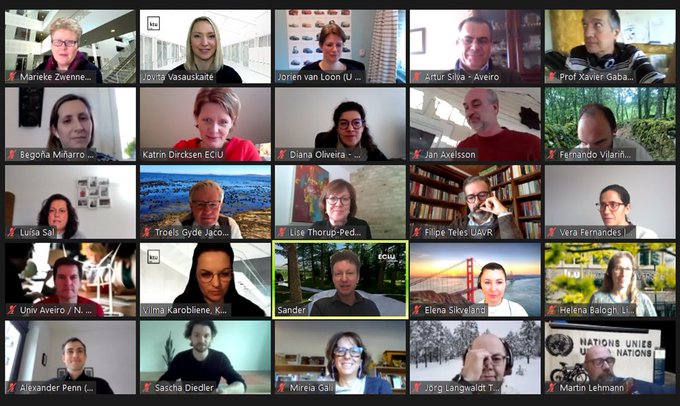
- Paving the road for micro-credentials
Last week, ECIU University presented its micro-credentials white paper at an online event with 300 participants from all over Europe and beyond. The high interest, engaging discussions and support for the paper, showed that the micro-credentials movement has momentum.
Sander Lotze, Project Director ECIU University, kicked off by asking why we are investing so much in micro-credentials. ‘If we aim for a European university, it is not our intention to do exactly the same as all the existing universities. We now have the opportunity to look beyond the educational concept, in a European context. We envisage an ecosystem of twelve universities with stakeholders. Our future learners are not only students, but life-long learners. They work together on challenges, choose their own learning path and come back to the ecosystem again and again to pick up or bring in knowledge. All the competencies acquired are then added into a so-called learning passport. To achieve this, micro-credentials are needed. We assume that each individual needs his own learning path. Through micro-credentials, learners can learn in a 'tailor-made' way, throughout their lives.
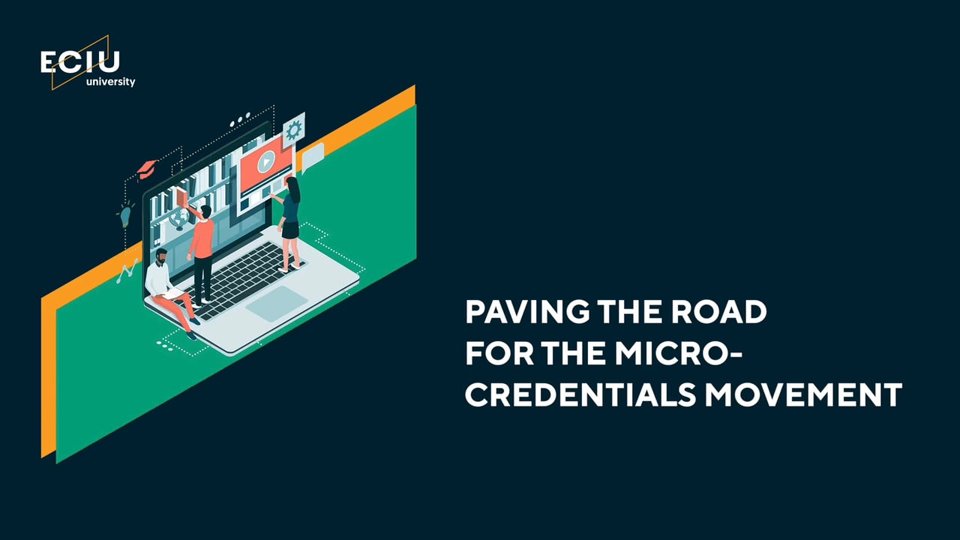
After the welcoming words of Lotze, it was Mark Browns, Director National Institute of Digital Learning Dublin City University, turn. 'One of the reasons for micro-credentials in education is the call for more focus on skills and competences,' says Brown. 'The argument for this, is the development of jobs. The World Economic Forum says 50 per cent of all employees will need reskilling by 2025. Jobs are changing and that's going to have an impact.’ Another reason for the need to develop more flexible learning pathways, is to increase life-long learners across Europe, says Brown. ‘As ECIU University we are happy to take up this challenge as a fore runner to pave the road.’
Vanessa Debiais-Sainton, Head of Unit Higher Education at the European Commission, agrees with Brown. According to her, there are three reasons for creating micro-credentials. ‘There is an urgent need for short learning experiences to acquire targeted competences and skills. Learning and training need to be more learner-centred, accessible for all, and more flexible. And finally, EU standards are needed for ensuring trust, recognition, validation and portability of micro-credentials across the EU.'
Opportunity
Micro-credentials are an opportunity to fundamentally change universities’ role in transforming learning and being a promising means of aligning universities with wider societal perspectives and valued social goals. Micro-credentials redefine the types of awards and qualifications offered by universities. They can align universities’ missions with wider societal, economic and environmental goals. Through the presented paper, ECIU University shares its vision and commits to concrete actions for the continuous development of the micro-credentials movement.
- ECIU University one year after launch
The ECIU University of the European Consortium of Innovative Universities is almost a year on its way. Project director Sander Lotze looks back on an eventful period, with COVID-19 as an extra challenge. He also looks ahead and outlines opportunities and expectations.
November 2019 marked the official starting in Brussels for the European Universities Initiative of which ECIU University is part. How has the university developed since then?
‘We have taken good steps. This autumn, the first challenges have actually been launched in education. Challenge-based learning is at the heart of ECIU University, both in education and in research and innovation. It's good to see that almost all partner universities will be offering CBL education next semester.
In the field of research, we have received a two million Euro investment from the Horizon 2020 Program. This money is intended to set up SMART-ER, a virtual research institute aimed at our smart resilient regions in Europe. This constitutes an enormous boost for our research.’
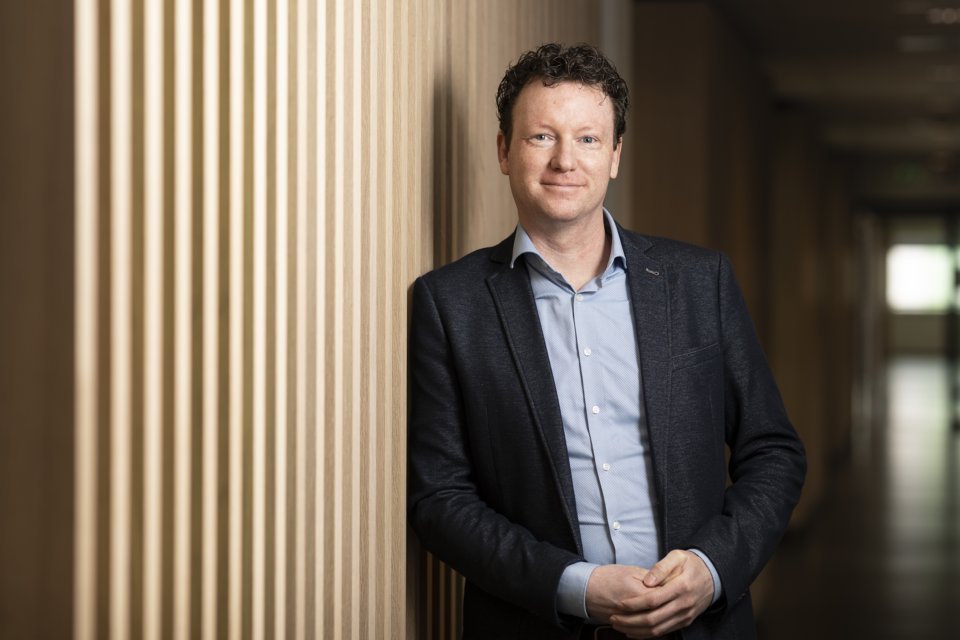
Shortly after the launch of ECIU University, the world had to deal with COVID-19. How did ECIU members deal with this?
‘ECIU is a network and it works by being together, through personal contact. Many ideas arise over a pint after the official meetings: that is where the agendas are aligned. Because of COVID-19, it was no longer possible to come together. Still, I have noticed that everyone, despite the difficult time in which we find ourselves, is committed to the project for one hundred percent. And everyone is still enjoying it. It's just strange to be in digital consultations with several people you don't know very well yet. On the other hand, as ECIU in the COVID situation, we had a big advantage of being an existing network and knowing our partners and each Board members very well. We have continued and everything has been picked up, albeit mostly online. One of the partners is now even working on a digital ECIU University where virtual collaboration is possible'.
The project has been running for almost a year now. What went differently than you had anticipated?
‘I thought we could get the ECIU University story out much faster. But we are working with twelve partners, all online. Something that seems very simple and easy is suddenly a lot more difficult. One example: the development of a challenge within educational units is something that takes place in the field of national regulations, times twelve. Complex, in other words.’
What challenges still lie ahead?
‘We want to make the challenges in the next semester - spring - bigger and more compelling, especially outside the existing curriculum of the universities. Furthermore, we are looking at different models for a competency passport; we will also start with challenge-based research projects and next year the concept will be opened to lifelong learners. And we look ahead: we are working on a clear vision for 2030 that describes the future role of ECIU University and indicates what we need from Brussels and from the national governments.
- UT invests 4,4 million in ECIU University
The UT Executive Board has decided to allocate in total 4.415 million euros to the ECIU University project. Their investment plan was approved by the University Council.
Read the whole article here.
- Skills Lab about stakeholder management
As an ECIU University student, you will work on challenges. And you don't do that alone. Together with so-called societal stakeholders, who work in a specific field, you get to work. But, who are you going to meet and work with? This week, UT lecturer Tim Jongman takes the participants of the Autumn Challenge into his skills lab on stakeholder management.
Why this workshop...?‘I want to make students aware of the force field in which they work. Just mentioning 'the municipality' as a relevant stakeholder is not enough. Whose door are you knocking on? Who are you dealing with? Think in terms of people. In addition, I am going to tell the students something about citizens' collectives active in wellbeing, housing and care. .’
Tell a bit more about that….‘Citizens' collectives are initiatives that originated bottom-up, by citizens. They operate alongside and with the government and the market and form a third, important player in the field. They focus on the local and regional environment and act on the basis of strong norms and values. Think of trust, equality and reciprocity. If you look at the Netherlands, there are more than twelve hundred citizens' collectives in the field of healthcare. And this number is growing. They are formed around all kinds of themes such as energy and housing, and they are influential. The playing field for solving challenges has changed and we have to acknowledge that'.
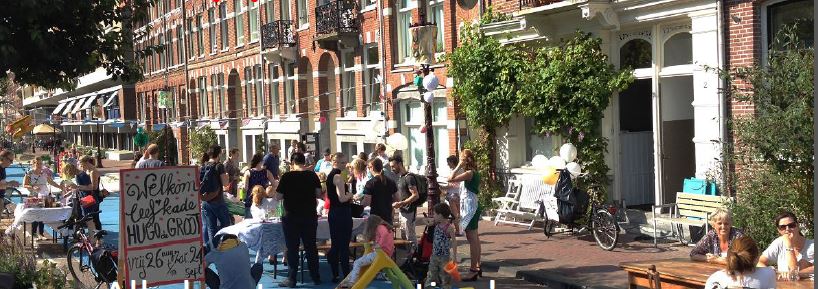 And what about reciprocity?‘I think it is important that students think about establishing a partnership on the basis of reciprocity. Not just take it away and pick it up, but also do something in return.’
And what about reciprocity?‘I think it is important that students think about establishing a partnership on the basis of reciprocity. Not just take it away and pick it up, but also do something in return.’What do you want the students to take home?‘Good stakeholder management. The ability to build a good network to solve their challenges. They must know which party needs to be involved and how to achieve this, for example through reciprocity. Often, a pitfall is to think at an organisational level and not on a human level, whereas people are the key to connecting.’ABOUT TIM JONGMANTim Jongman is a Social Engineer. He owns T-Projects and is involved in project and process management, transition management, research and social business case development. He also works at Novel-T as a research consultant and is a lecturer at NIKOS. He is the treasurer of Nederland Zorgt Voor Elkaar and a member of the board of the regional coöperation Twentse Noabers.AUTUMN CHALLENGEThe ''smart, resilient and happy communities Autumn Challenge Experience Programme is a unique, alternative international experience organised by the University of Twente and powered by ECIU University. It is a flexible, international short-term program. Students get the opportunity to come together in an international, collaborative and digital environment to work on a real-life challenge and to co-develop solutions, while at the same time they have access to various lectures, workshops, master classes and other fun activities.
- Two million euros for research initiative
ECIU University receives 2 million euros from the Horizon 2020 programme. The financial support is intended for strengthen research and innovation, and for establishing the SMART-ER, a research institute for SMART European Regions.
The research center implement a new model of doing research and innovation without barriers. Its scientists will overcome the limitations of disciplines, sectors and countries. The research is mainly based on a virtual collaborative environment and will promote the dialogue with society.
Jointly, the members will pilot capacity building programmes (Seed Programme and SMART-ER Academy). Citizen science initiatives will be used as a testbed to put into practice all the mechanism and structures built.
The funding allows ECIU University partners to address complex societal challenges together under the framework of the United Nations Sustainable Development Goal (SDG) 11: Make cities and human settlements inclusive, safe, resilient and sustainable.
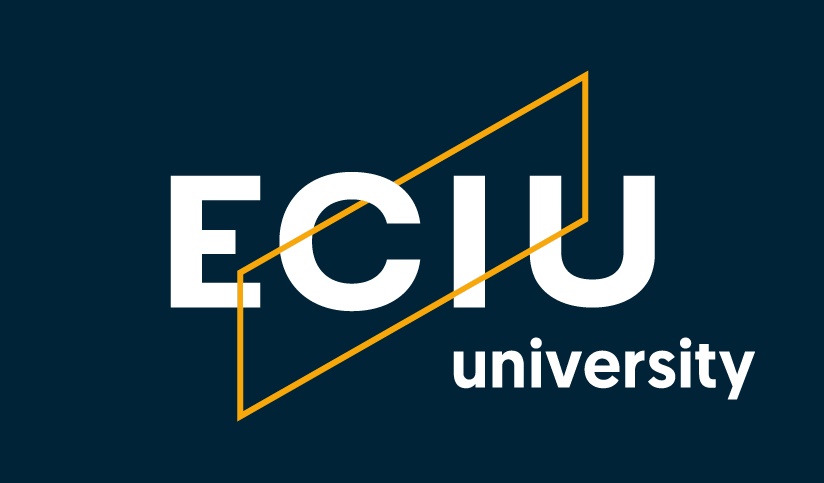
- EU Commissioner Mariya Gabriel about ECIU University
The ECIU Presidium had a meeting with Mariya Gabriel, EU Commissioner for Innovation, Research, Culture, Education and Youth, on the future of higher education in Europe, Friday June 5th.
The participants discussed the role of the European Universities initiative in the future of European higher education and the urgent need for innovation to counter the economic impact in post COVID-19 period.The consortium shared their vision about the future of European Universities. Discussion topics included the challenge-based learning, blended mobility, micro-credentials and lifelong learning: the opportunities that the ECIU University is now is piloting.Gabriel was very positive about the ECIU University’s front runner role, especially in micro-credentialing process and asked the ECIU to stay actively involved in discussions around European Research Area, European higher education area and Europe’s digital agendas. The education and research innovations now being implemented at the ECIU University can act as a testbed and pave the way for further development in all European higher education erea, as well as become a catalyst for social innovations in Europe. She encouraged the ECIU University to stay in a close dialogue with the European Commission on the future of universities in Europe.The ECIU university has a very ambitious and deep vision to remodel the European higher education and to establish a true European University where learners, researchers, business, public organizations and citizens create relevant innovative solutions for real life challenges with real societal impact.Around the table: The President of European Consortium of Innovative Universities (ECIU), Victor Van Der Chijs, the Vice-President, Per Michael Johansen, Treasurer, Màrius Martínez and ECIU University Project Director Sander Lotze participated in the meeting with the EU Commissioner.
- Autumn challenge has begun
‘Come and join our team’
Initiator Elena Tsigki looks back with satisfaction on the kick-off meeting of the Autumn Challenge, powered by ECIU University, last Thursday. For twelve weeks, the forty participants work on challenges based on social issues. There will also be room for fun activities. It is all about the experience,' says Tsigki.
The online session started with a riddle activity for the students, which lasted for about 15-20 minutes. ‘They could immediately get to work with a mini challenge,' says Tsigki. The riddle was based on Einstein's five-houses riddle. By answering questions about people, you can find out who lives where. Of course we had questions about the tutors for this edition. The tutor who drinks tea has Marie Curie as a favourite scientist, the tutor who likes blackcurrant fizz likes football as well, and so on. It was a lot of fun. Students had to work under pressure and time limits and already experienced their first challenge.’
After the break-out session, UT President Victor van der Chijs welcomed all participants with a video message. ‘This course that you are about to enter is an extracurricular, challenge-based program that is hosted by the University of Twente and powered by ECIU, the European consortium of innovative Universities. It is the first time that this program is on offer and it gives students and unique virtual experience to work in an international environment working on real life challenges. You will be working with students from Trento, Tampere, Linköping and Toulouse. That is quite a large group. I hope you will have a good course and a lot of fun.’

After that, the seven challenge providers were on. In five minutes’ time, they pitched their social issues. ‘It was nice to see that all parties involved were recruiting and really asked participants to “come and join our team”. The challenges came from, among others, the municipality of Enschede, the welfare organisation Impuls, and the platform Lucrum for the creation of a care hotel. ‘But there is also an individual issue provided by Mark Scholten. He wonders how can we improve the availability of spatial information for the vision impaired.’
The program continued last weekend. The teams were formed. The students could indicate their preference through a ranking from 1 to 7, and on Saturday and Sunday the first lecture and workshop were held. ‘From now on, it is a matter of monitoring, seeing how things are going and supporting the students to have a good experience.’
--
The ''smart resilient and happy communities'' Autumn Challenge Experience Programme is a unique, alternative international experience organised by the University of Twente and powered by ECIU University. The Autumn Challenge is a flexible, international short term programme aimed at engaged learners with a vision to make a change in their communities and regions. This programme can be followed aside from your regular curriculum and will fully take place online. It offers the opportunity to learners to come together in an international, collaborative and digital environment to work on a real-life challenge and co-develop solutions, while at the same time access various lectures, workshops, masterclasses and other fun activities.
